Report from W. F. Rhinow to J. A. A. Burnquist, August 5,1920.
Images
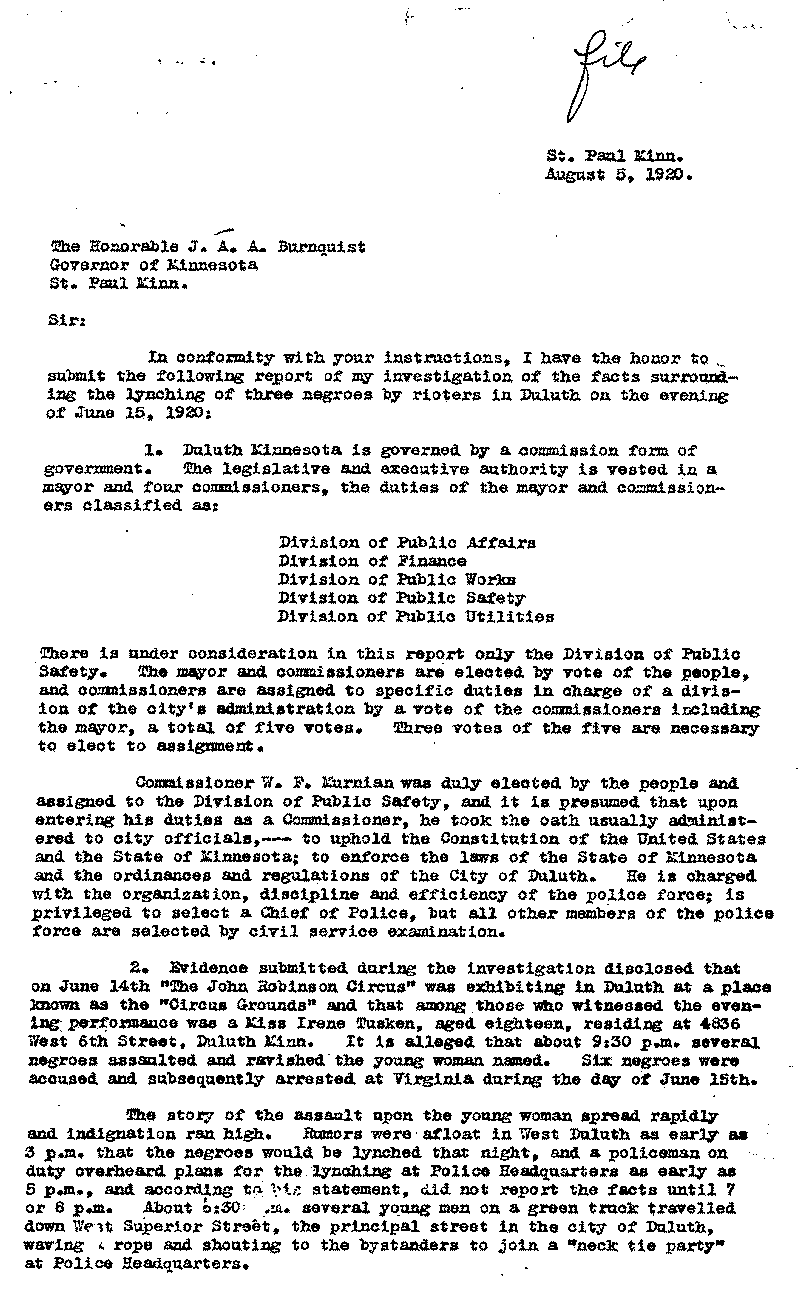
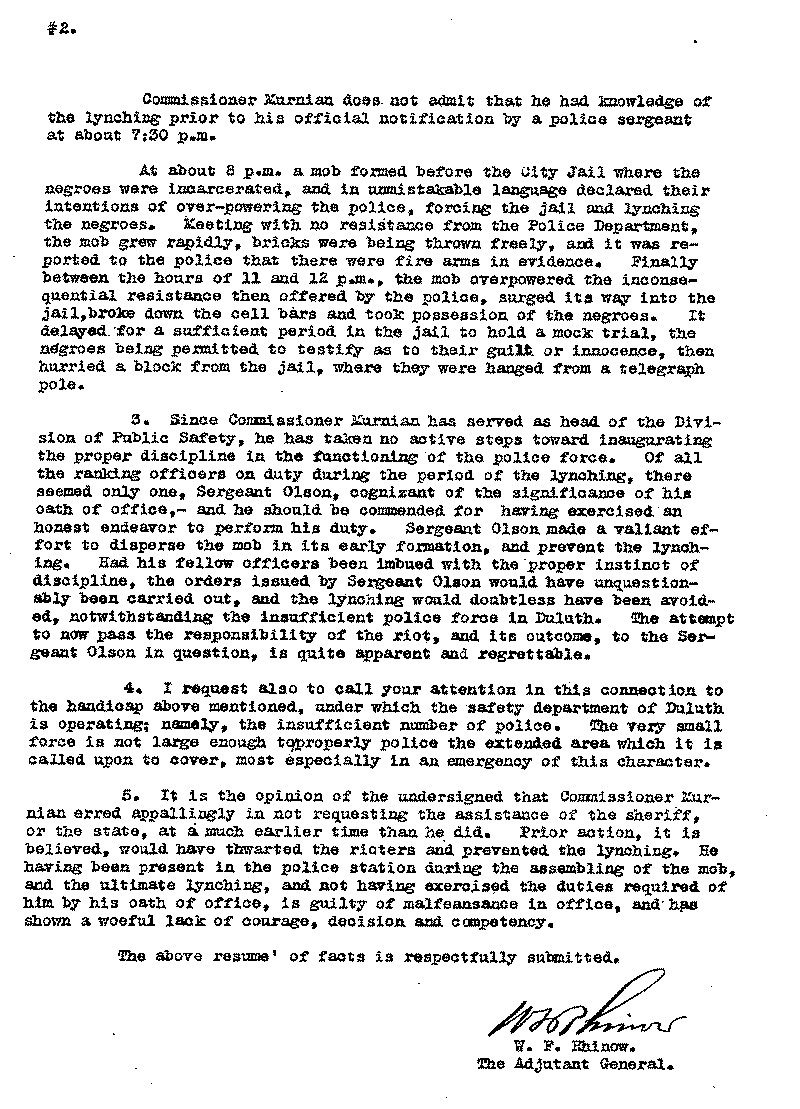
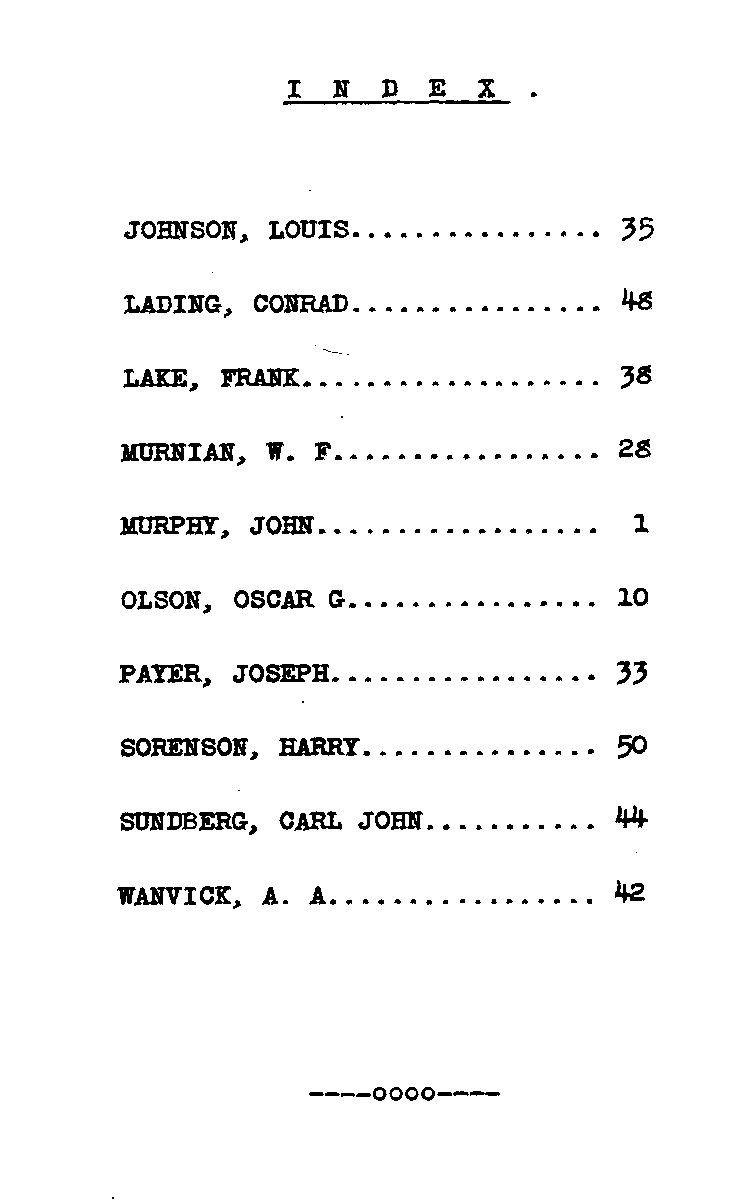
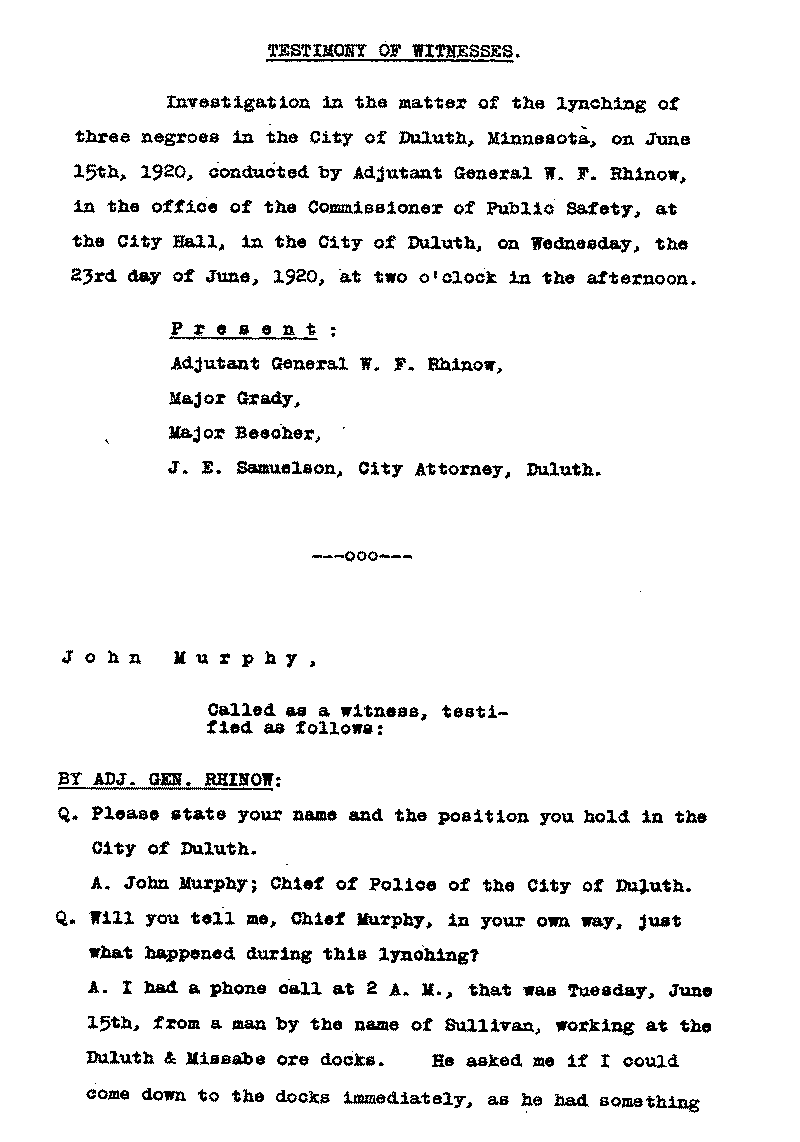
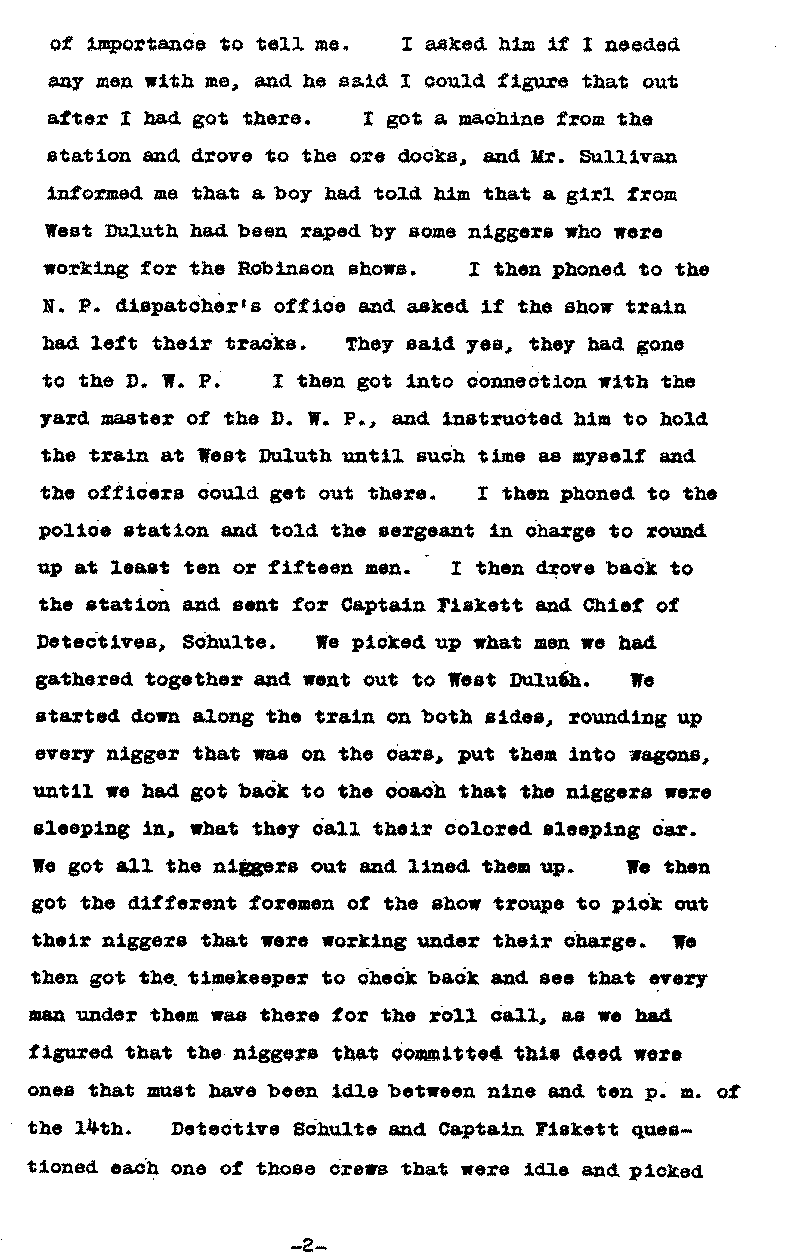
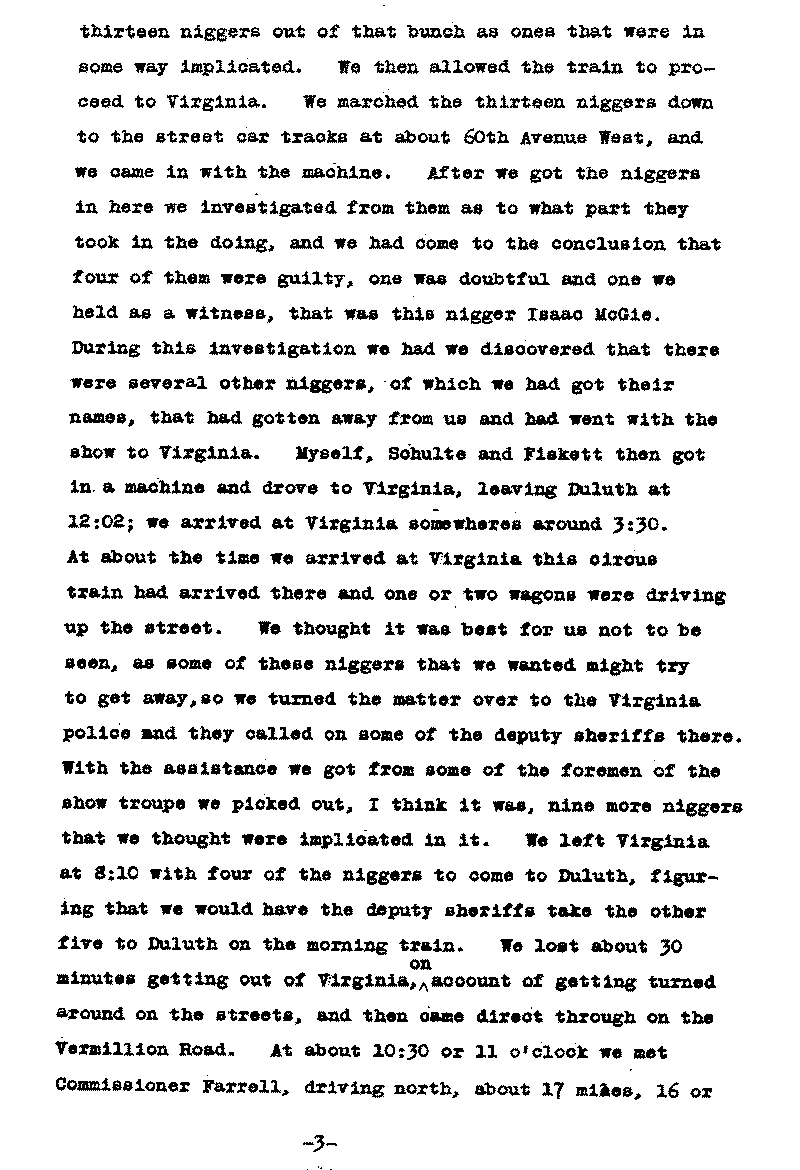
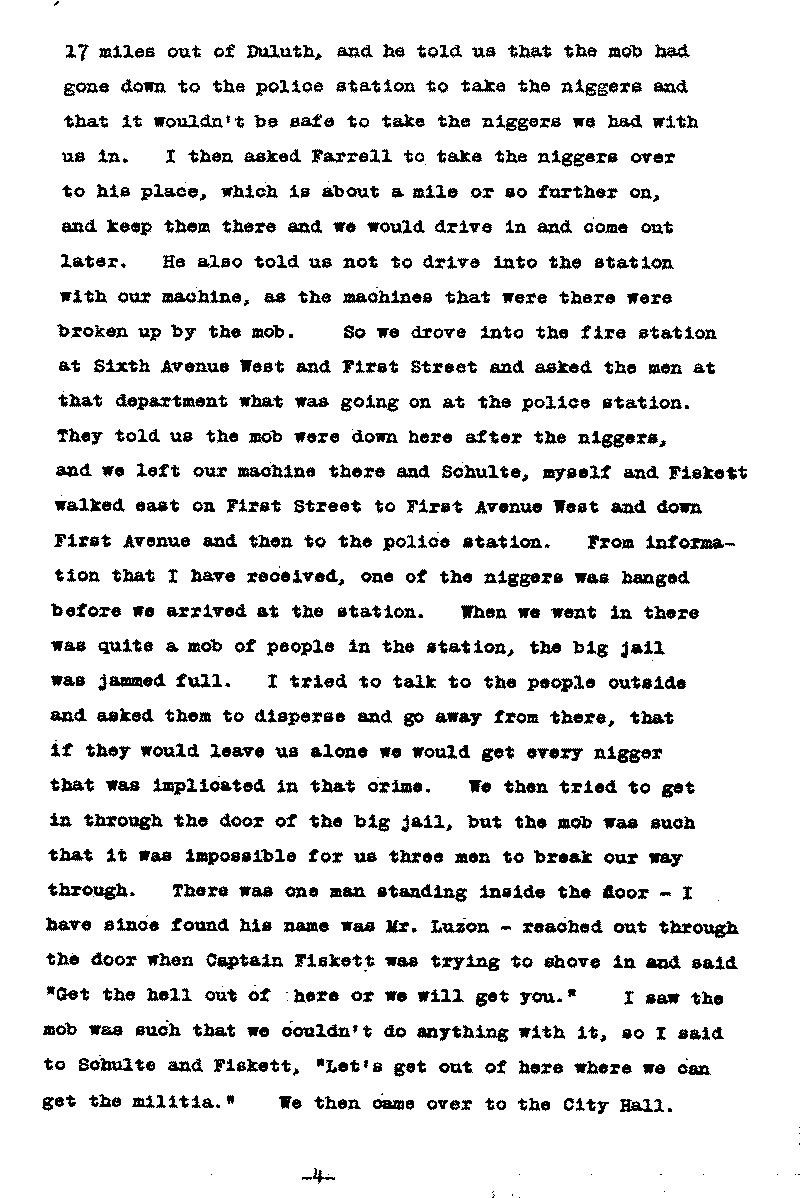
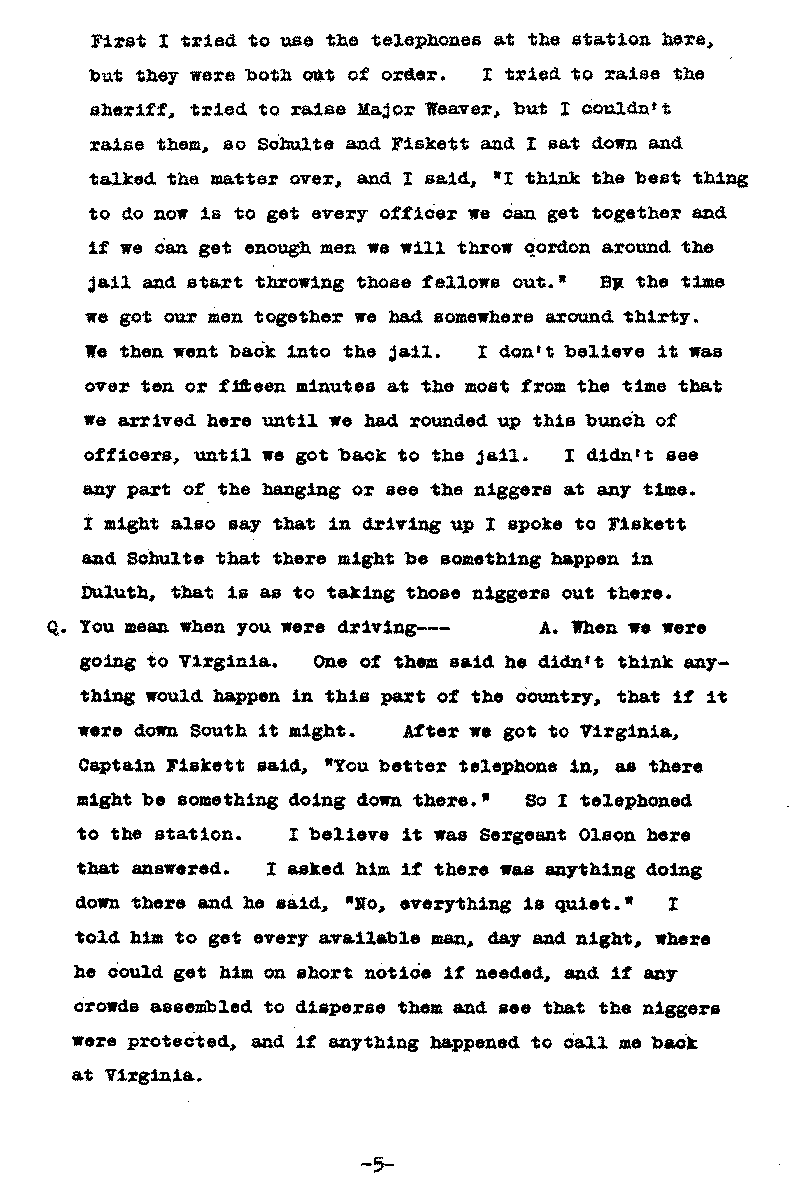
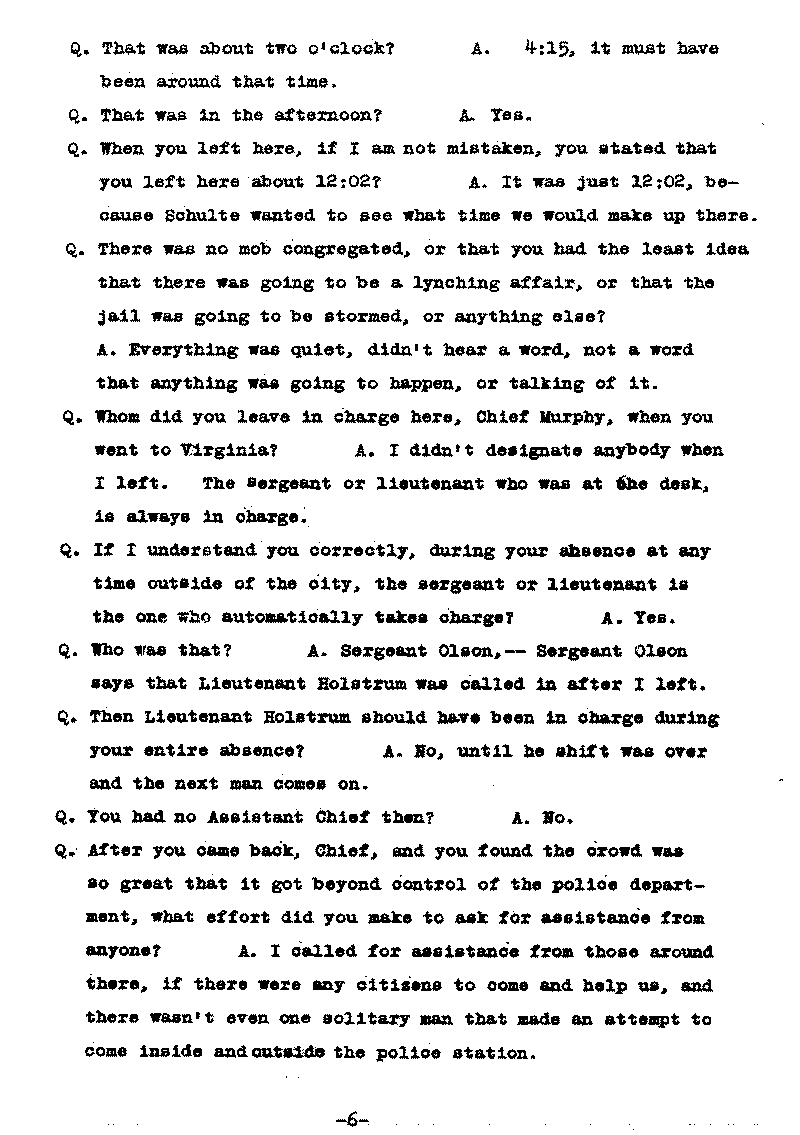

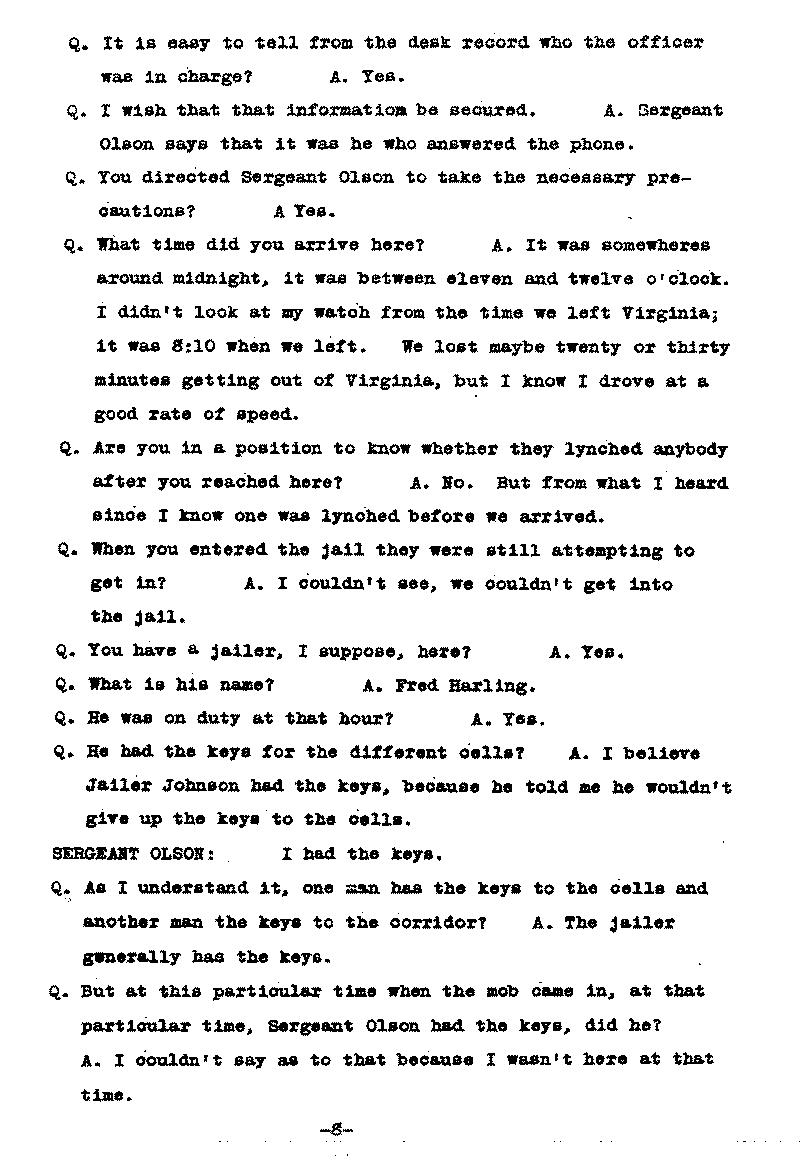
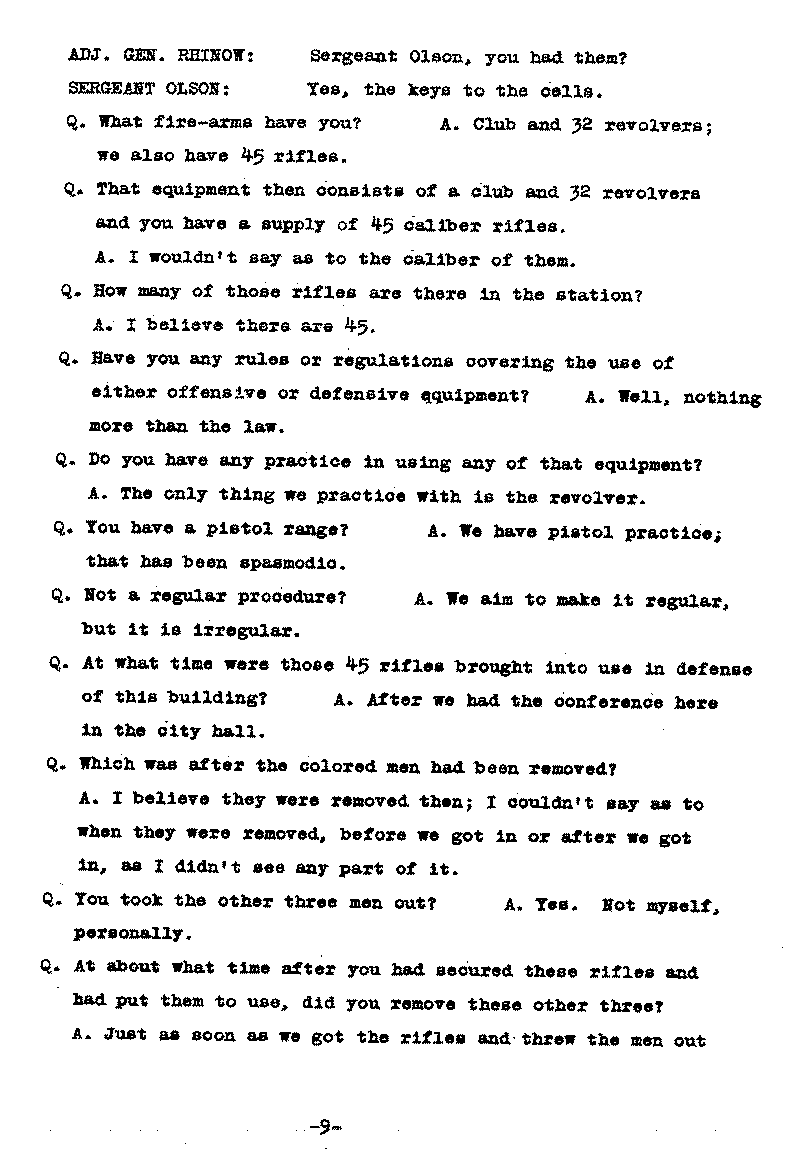
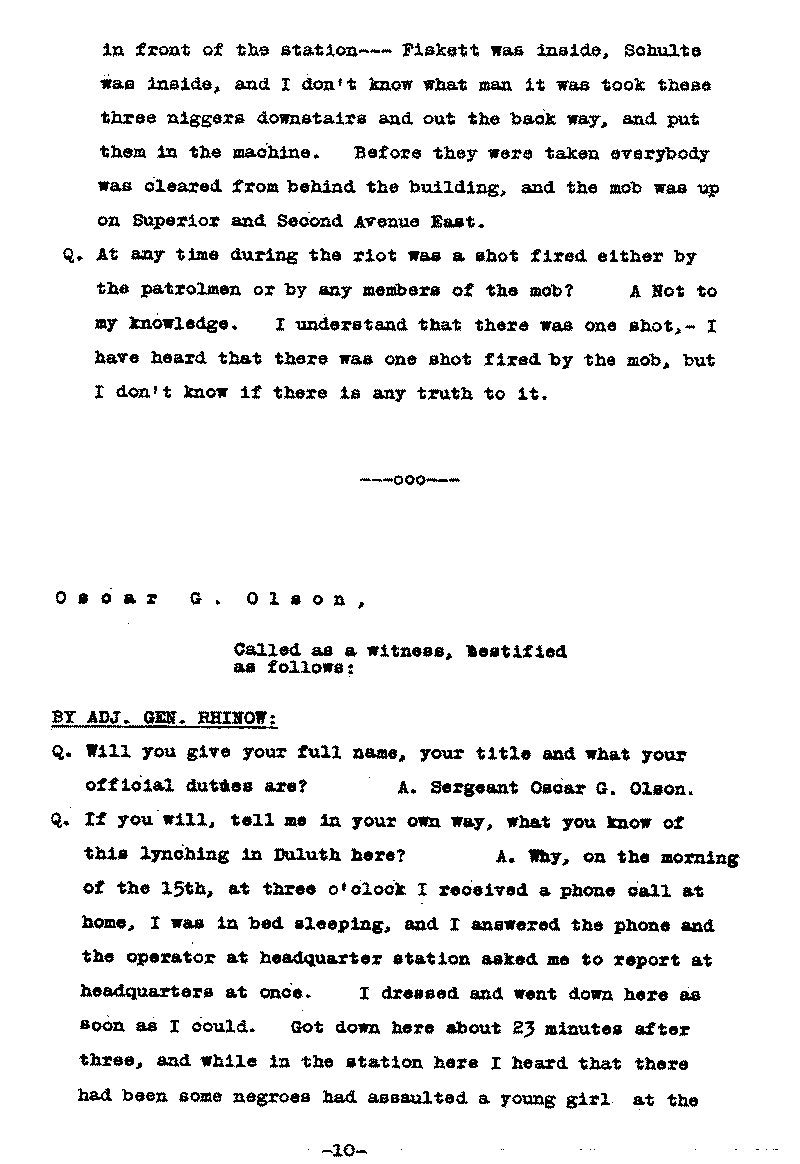
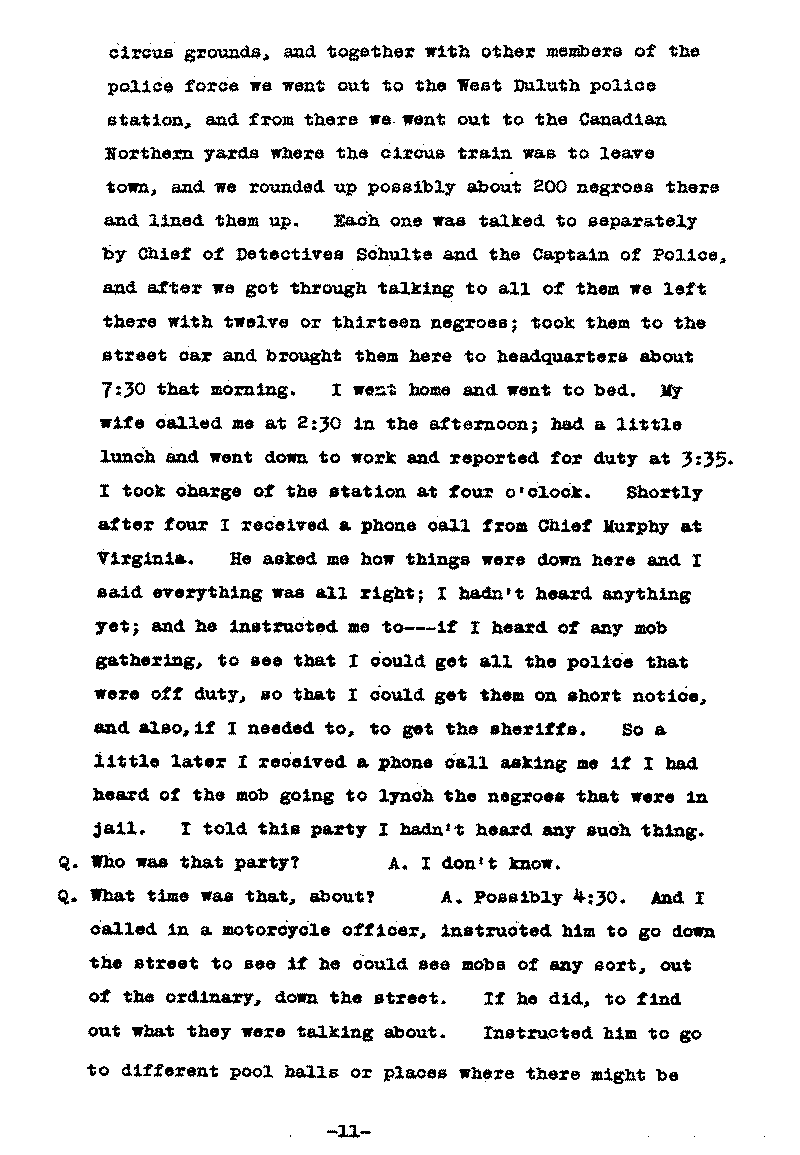
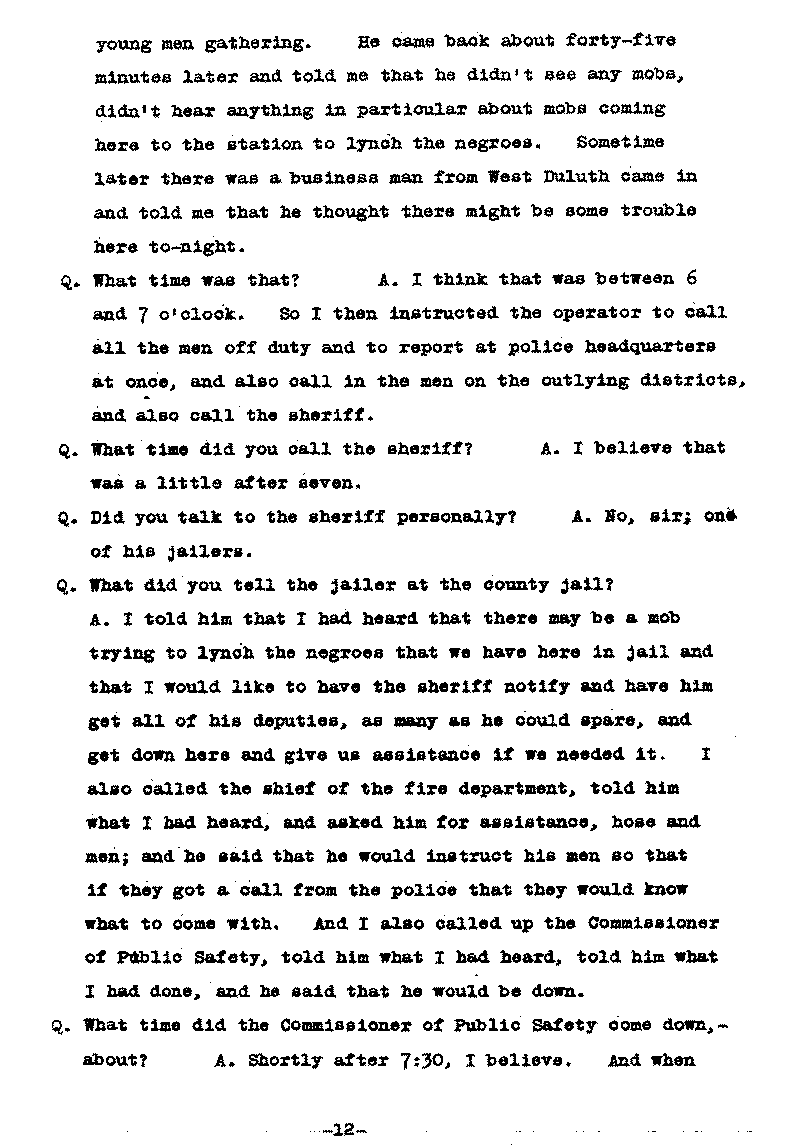
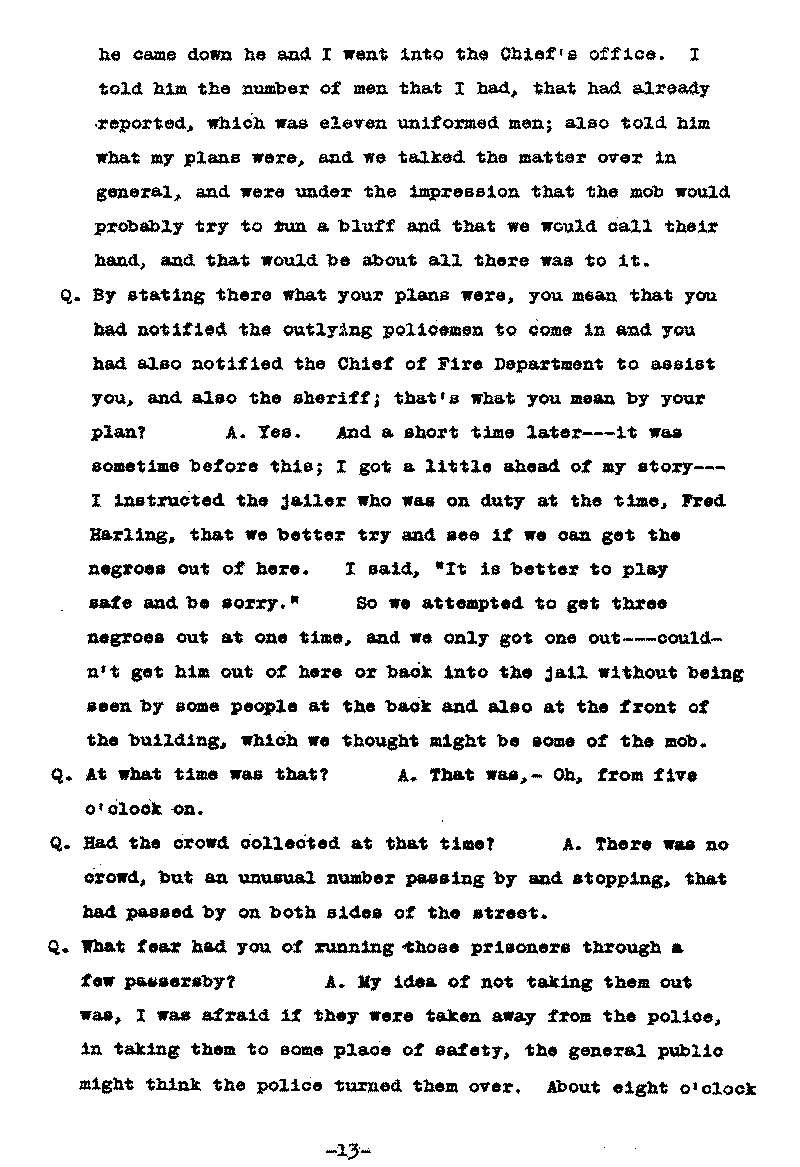
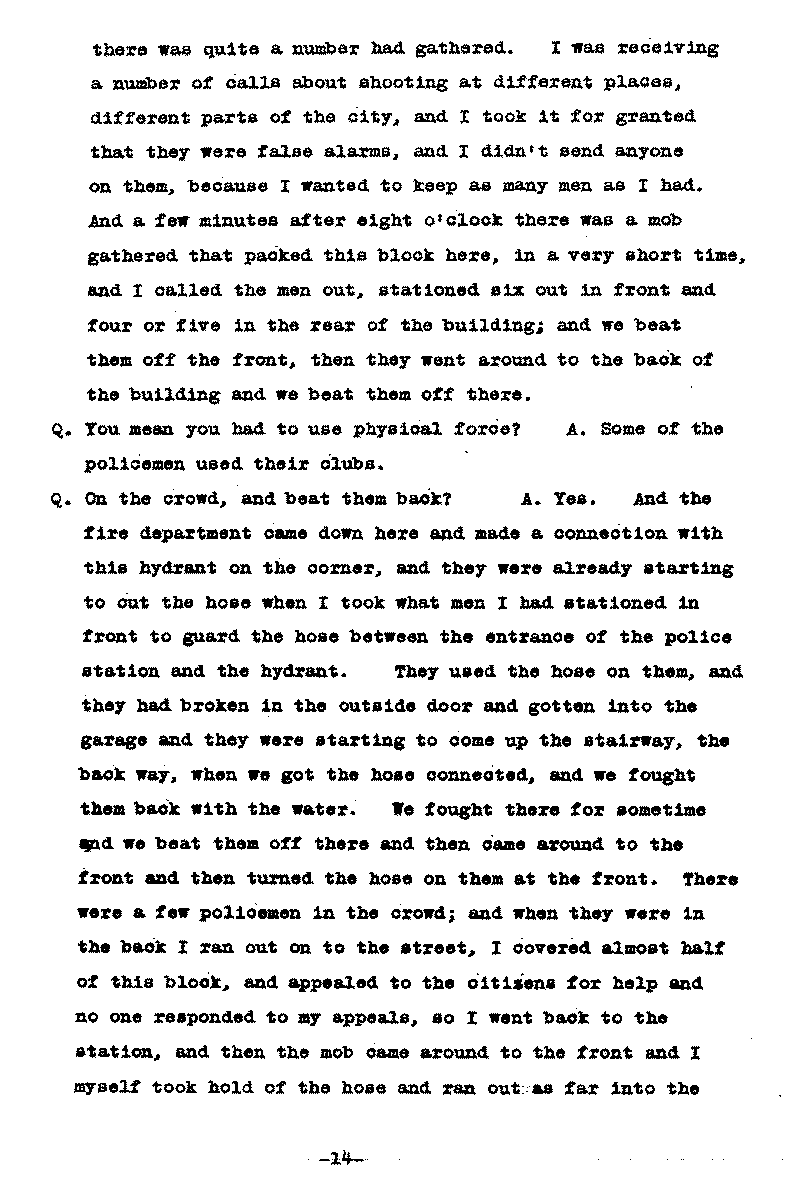
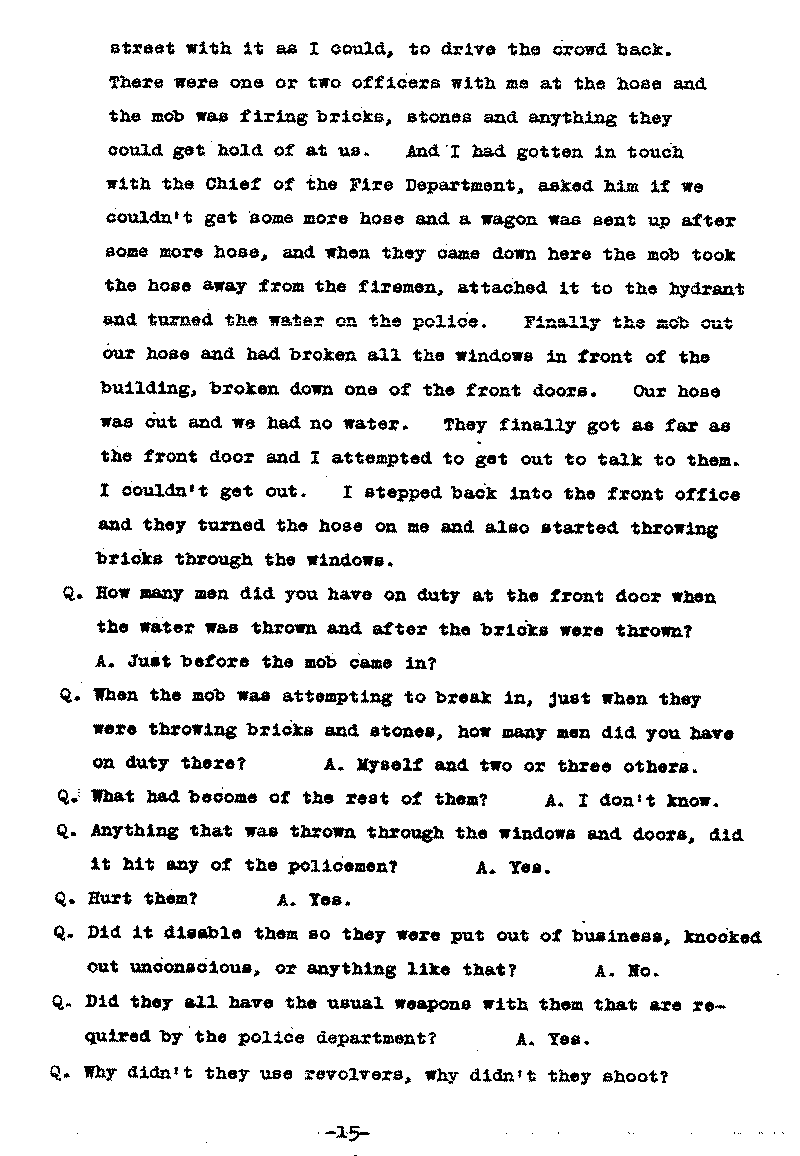
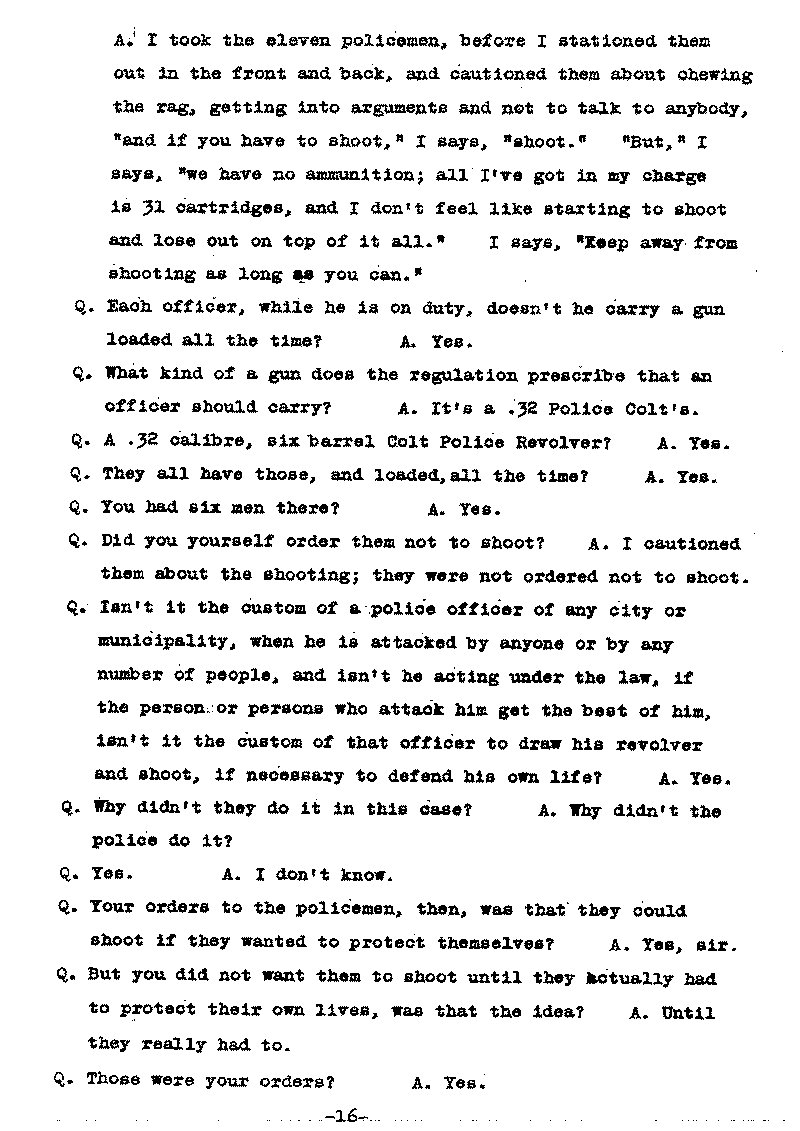

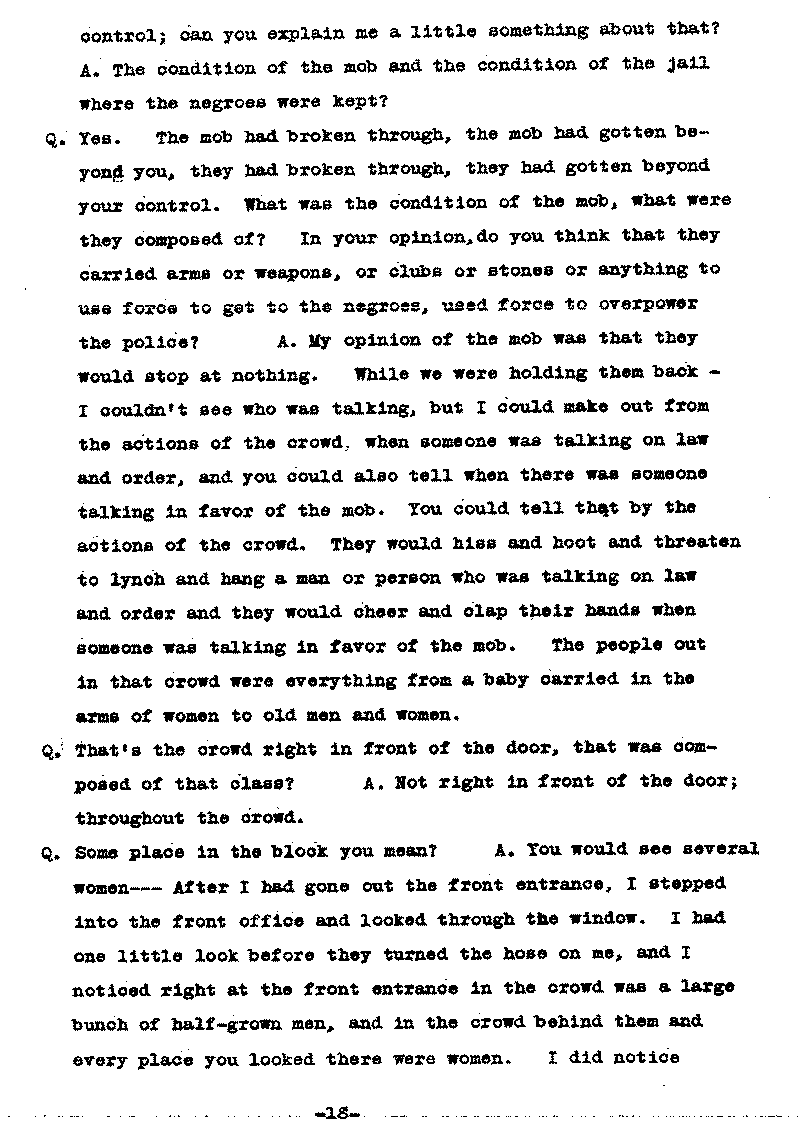
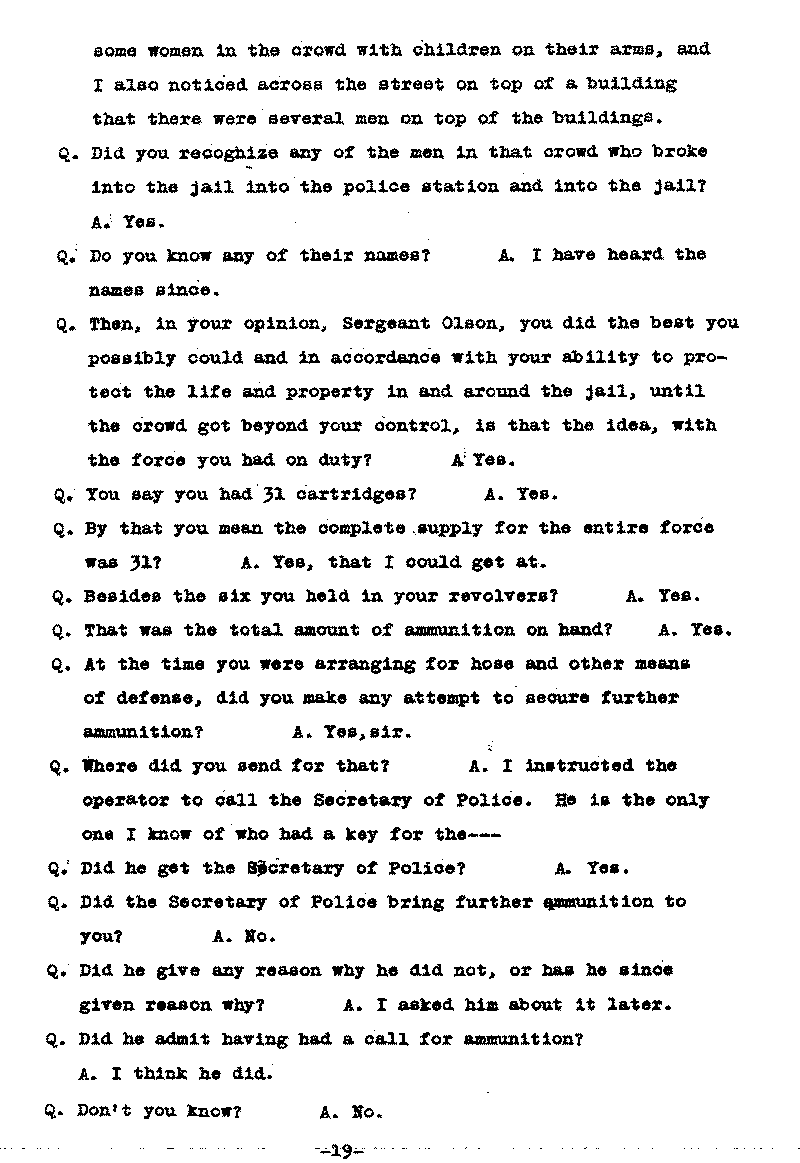
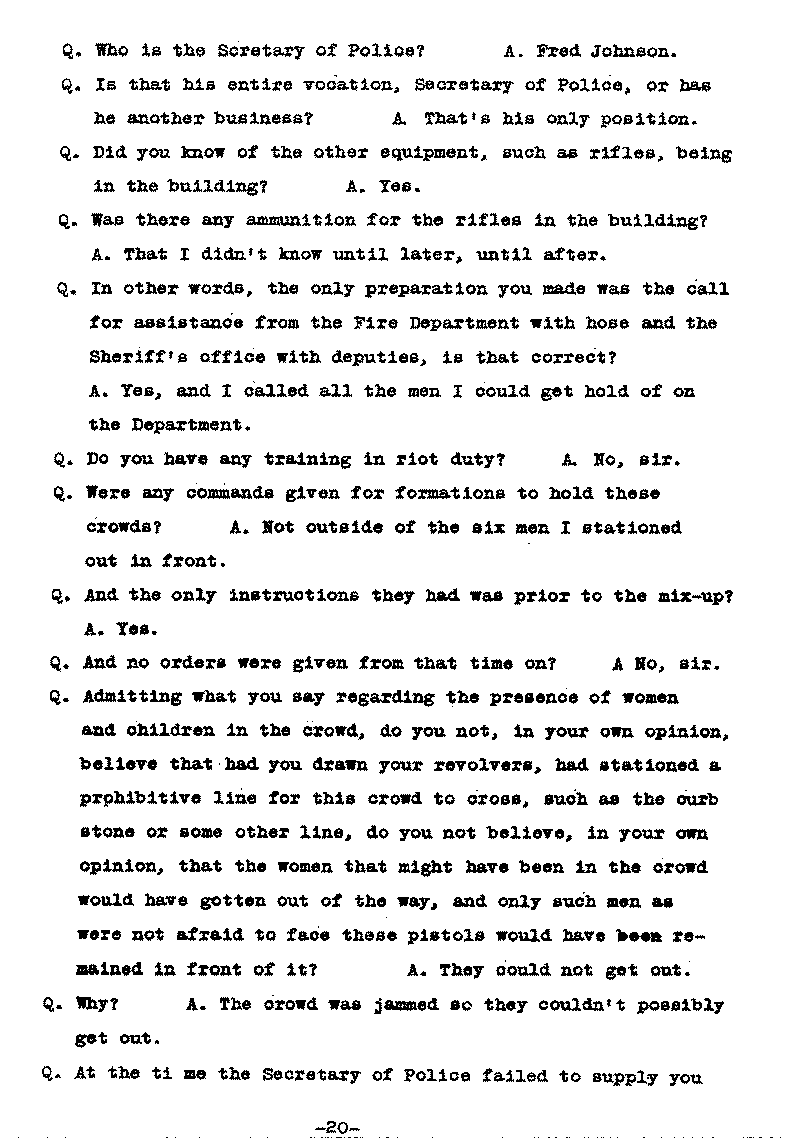
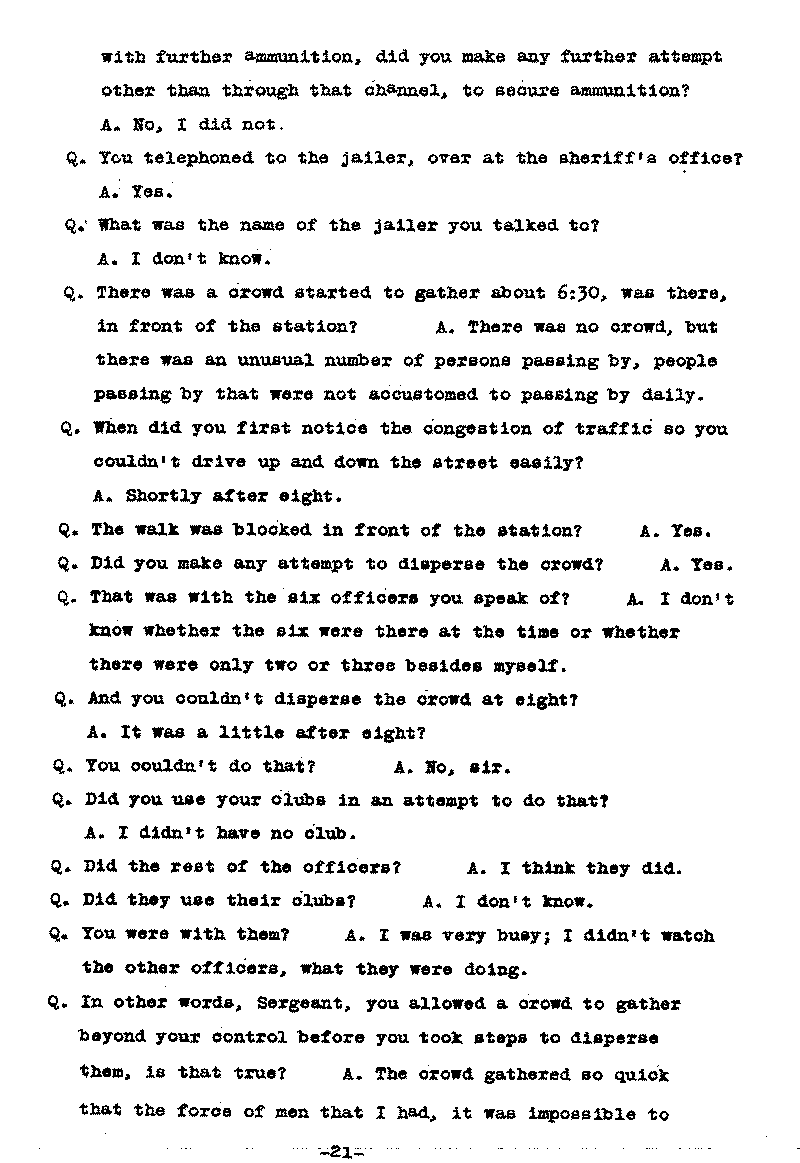
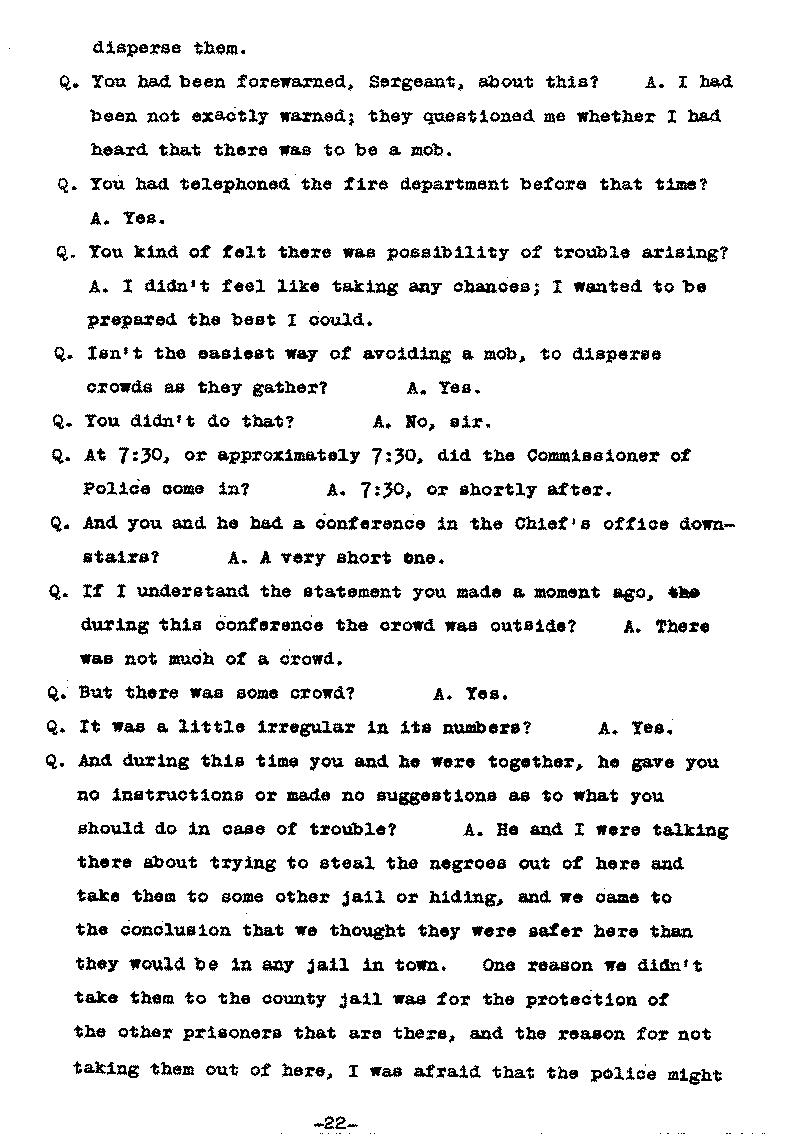
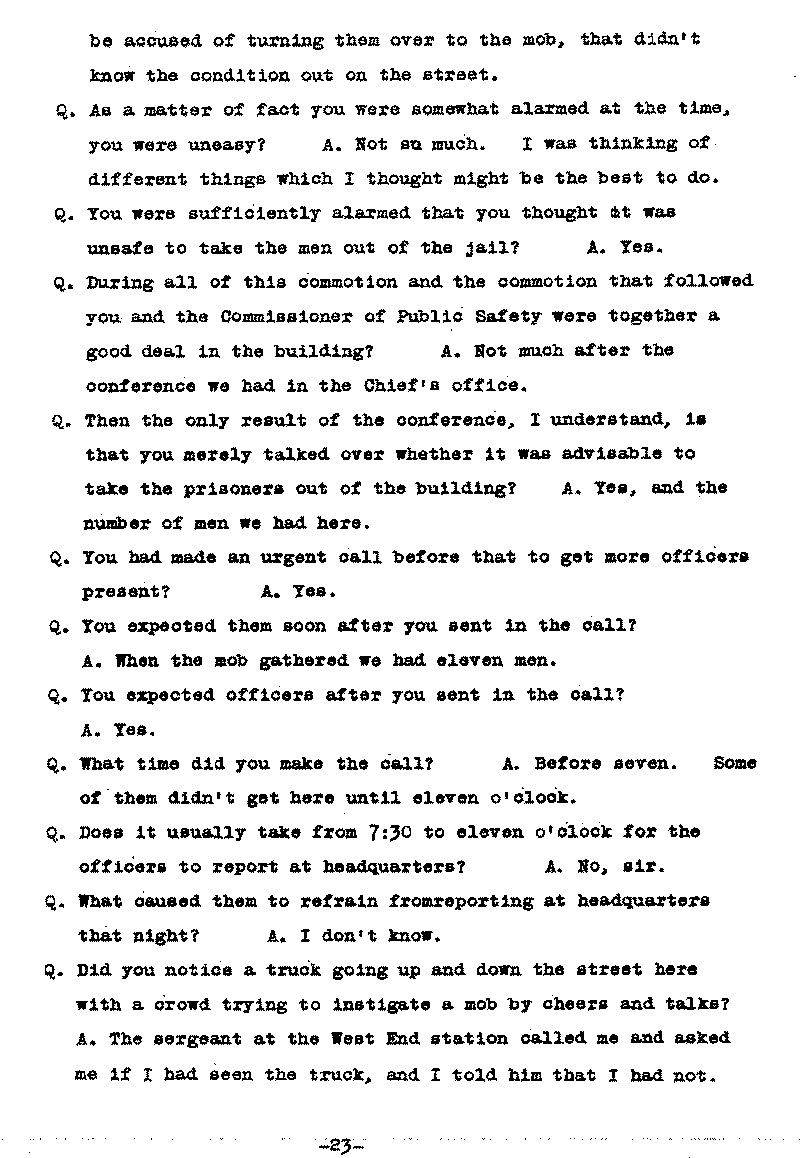
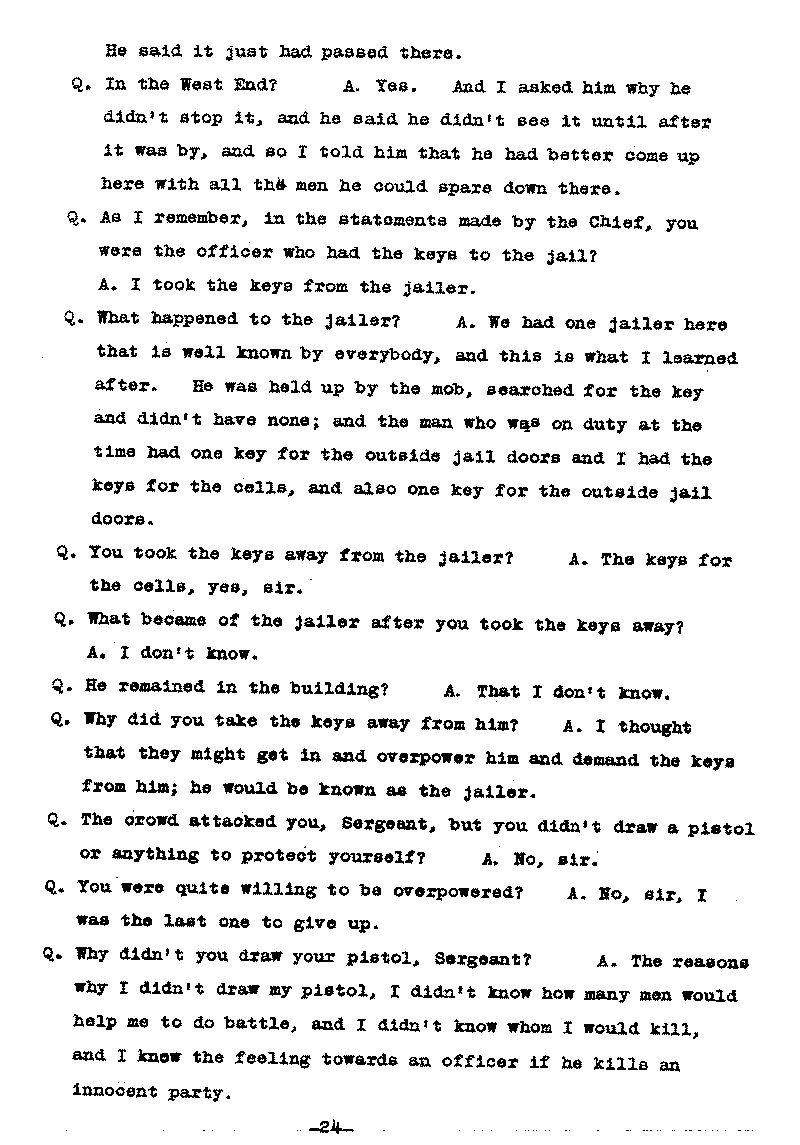
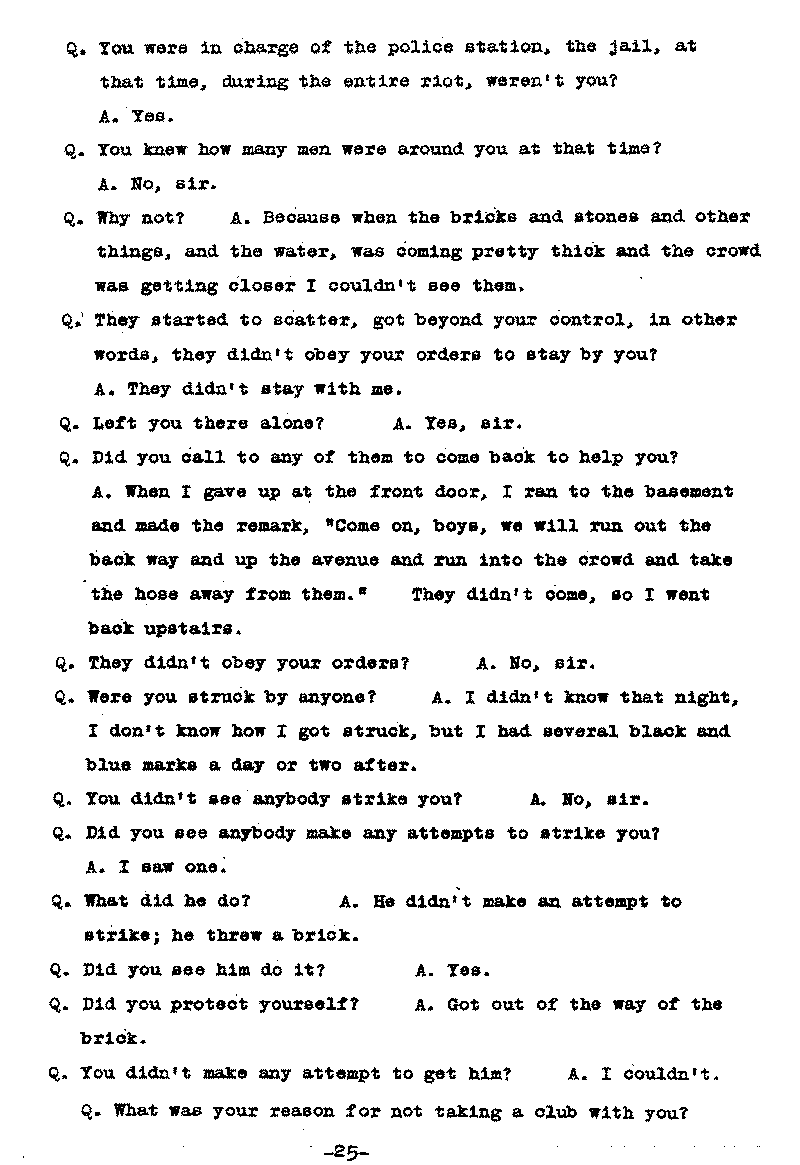

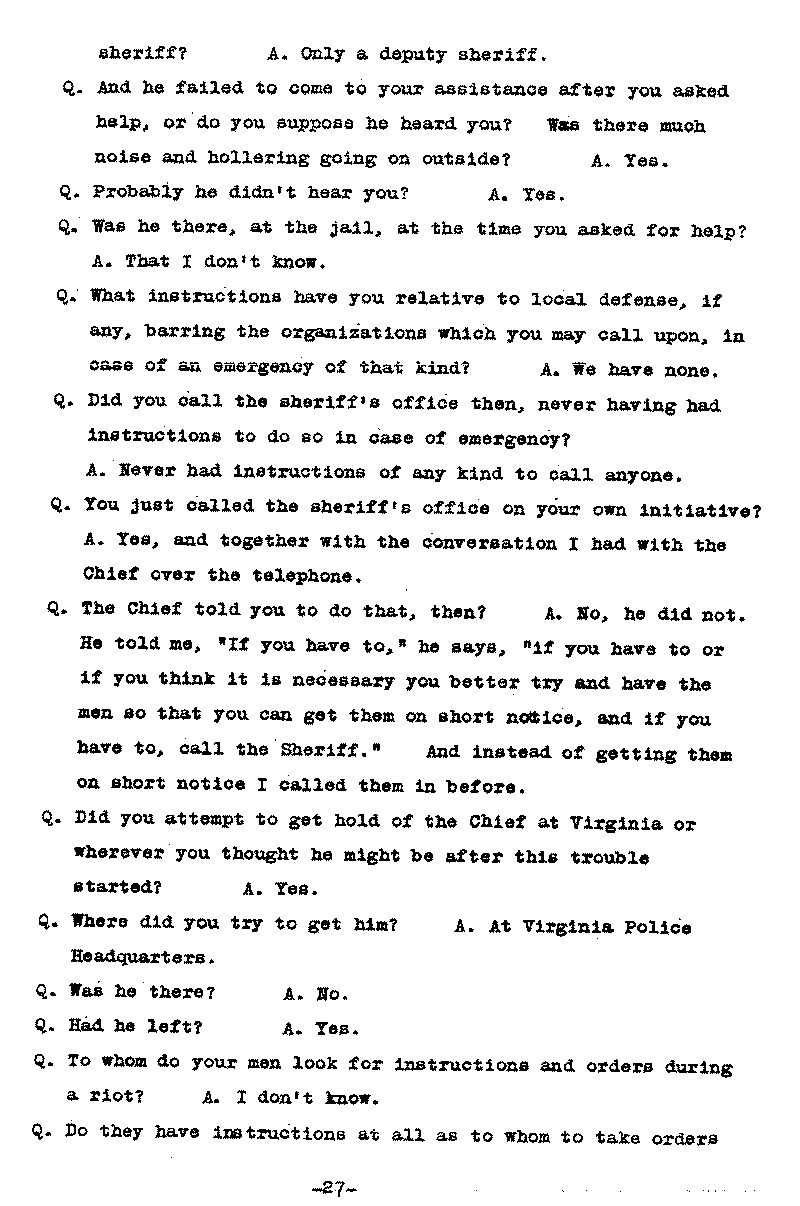
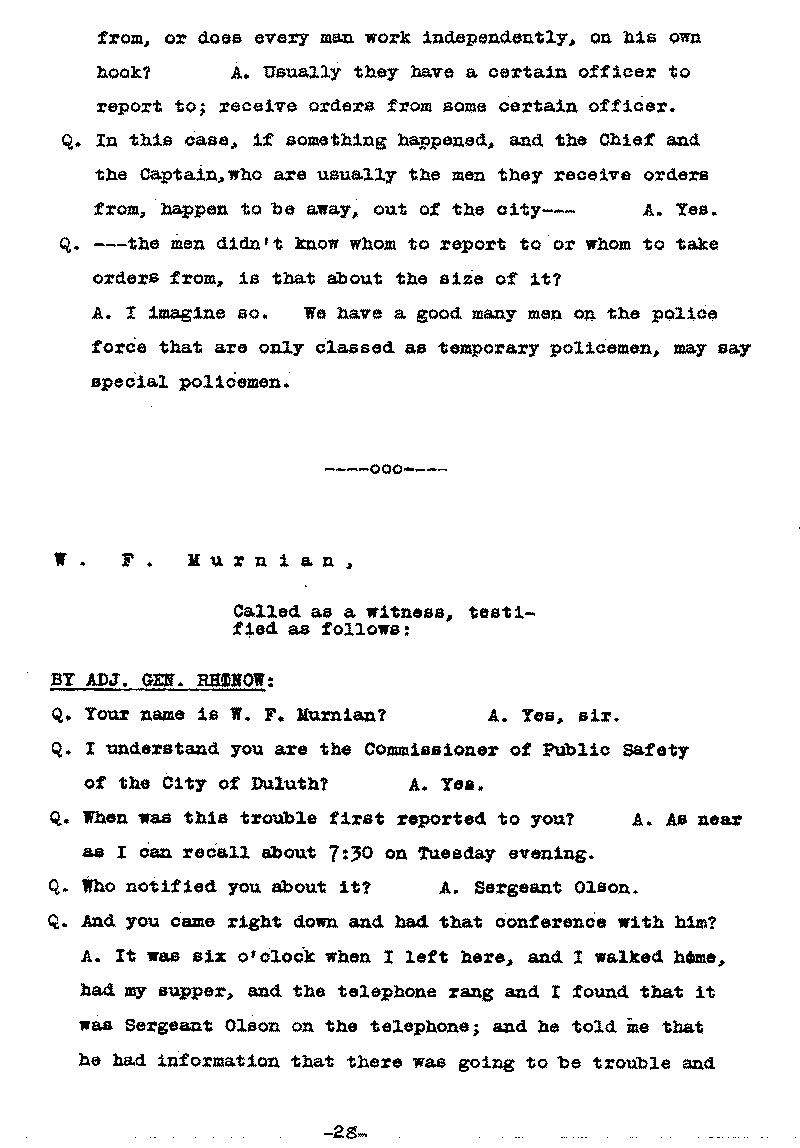
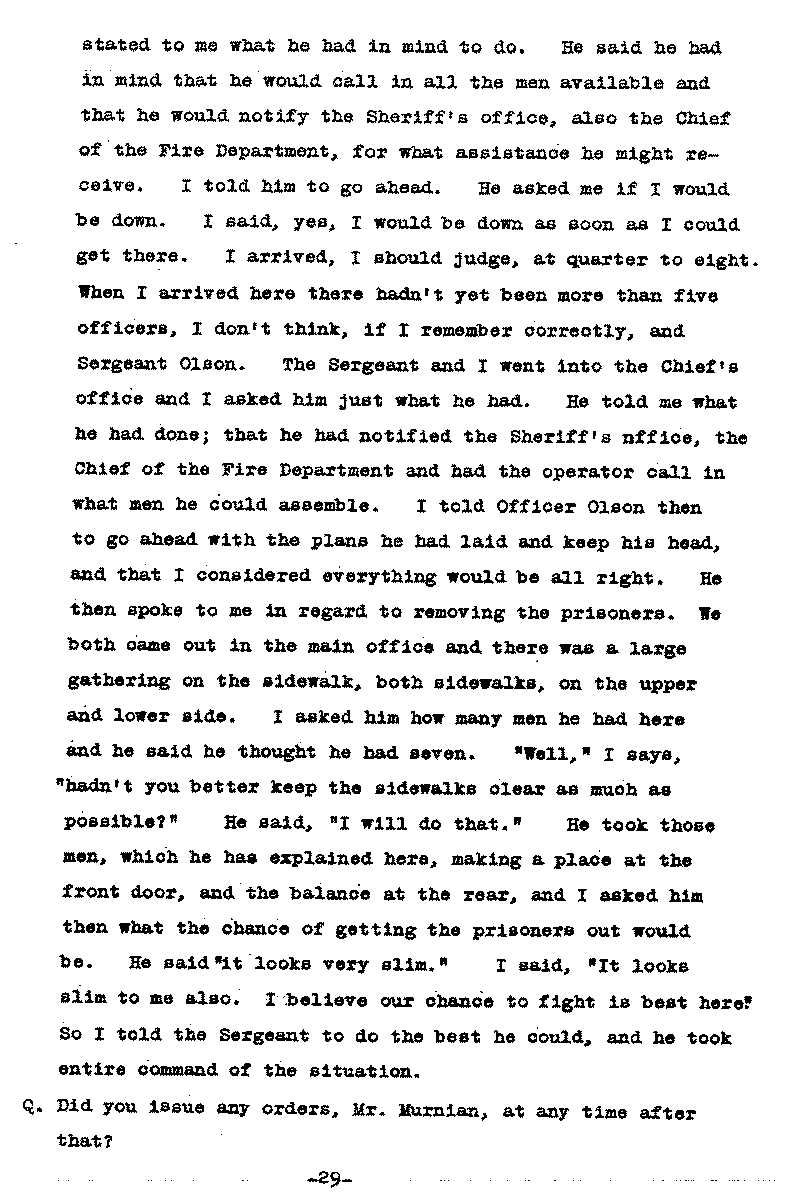
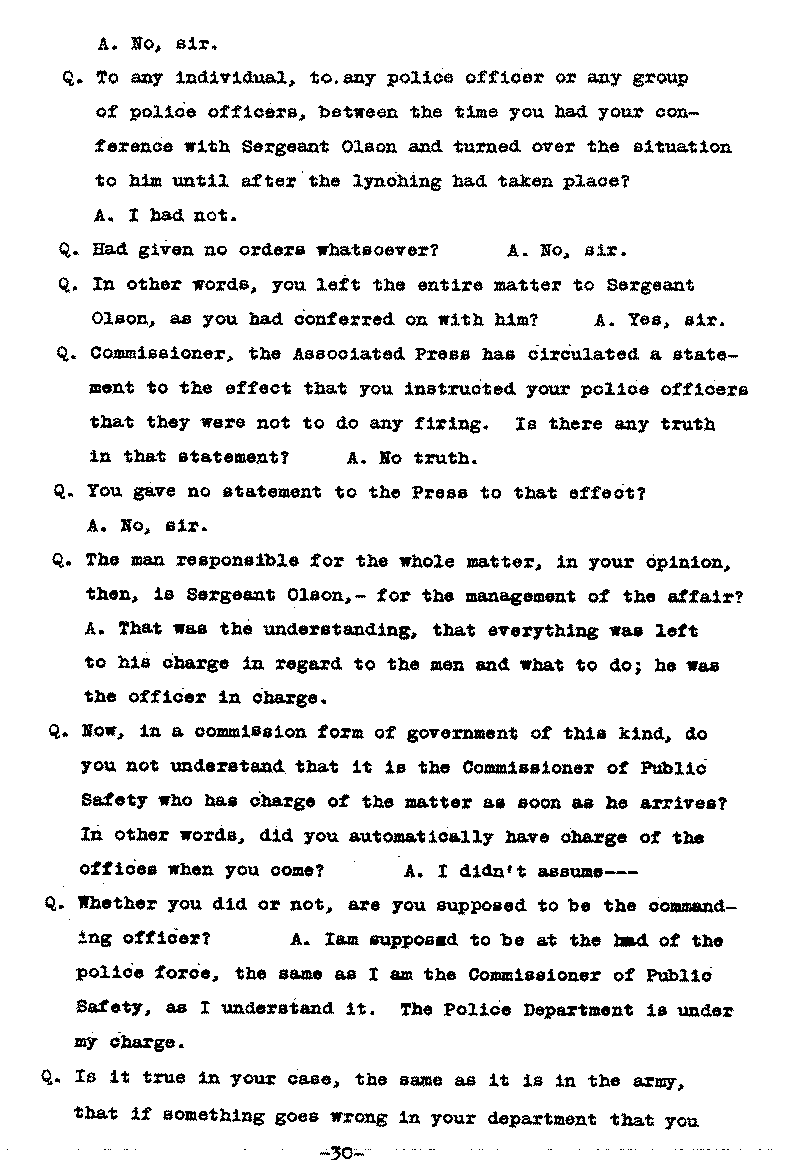
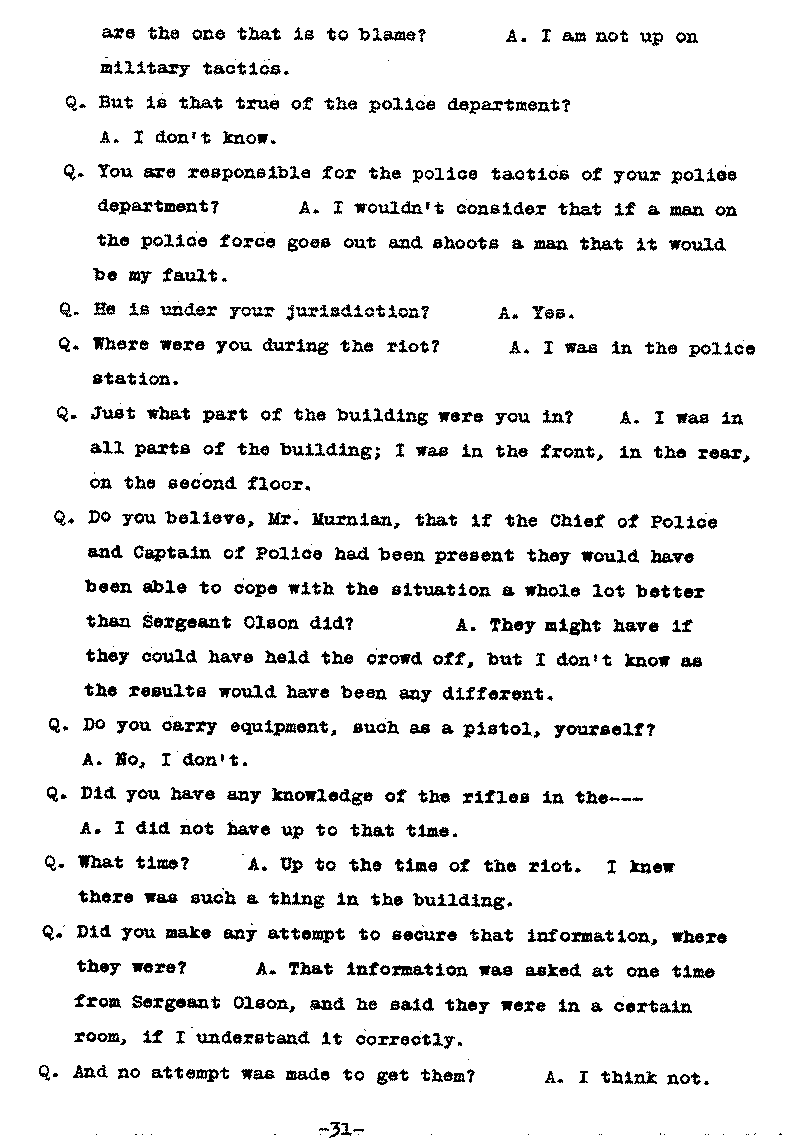
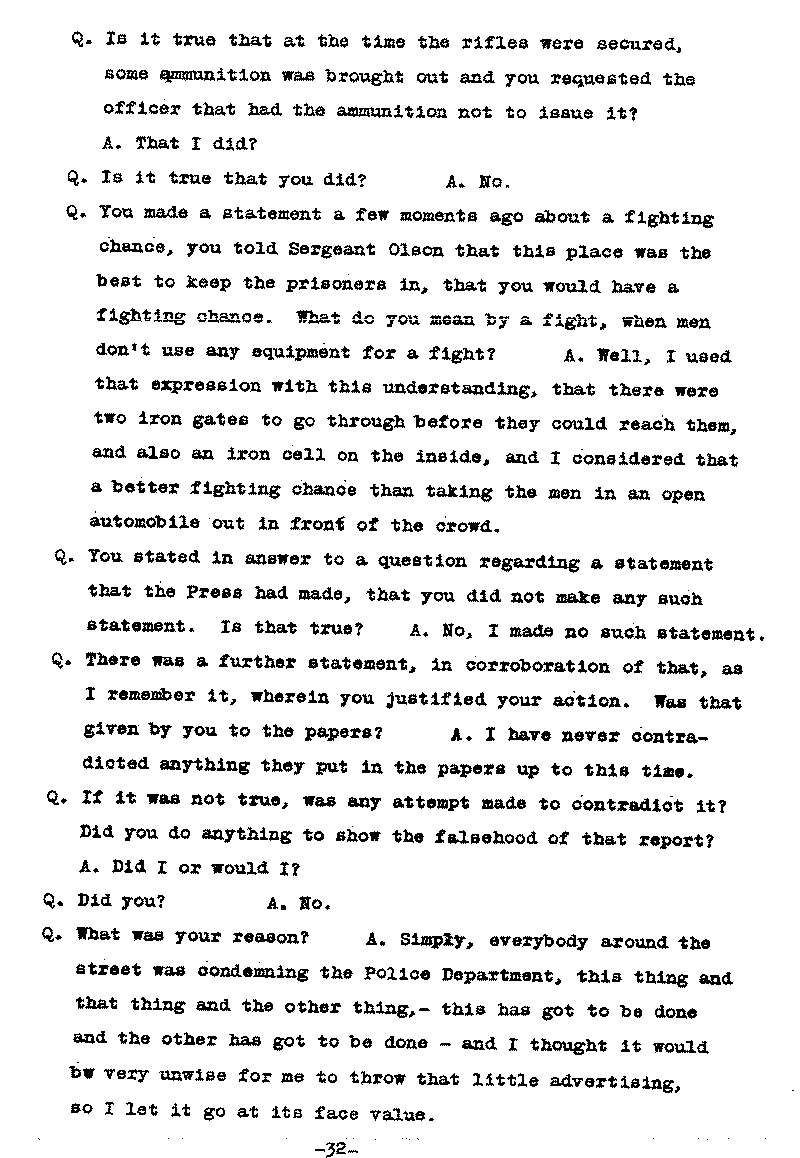
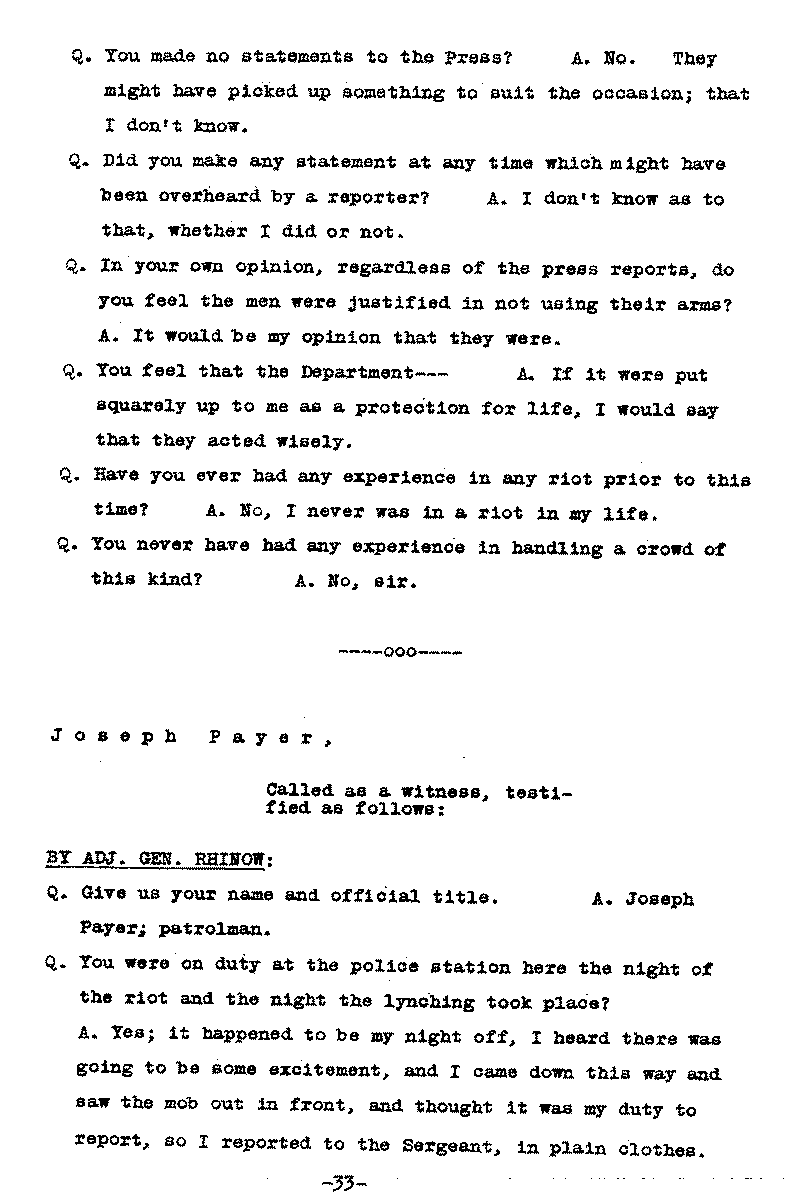
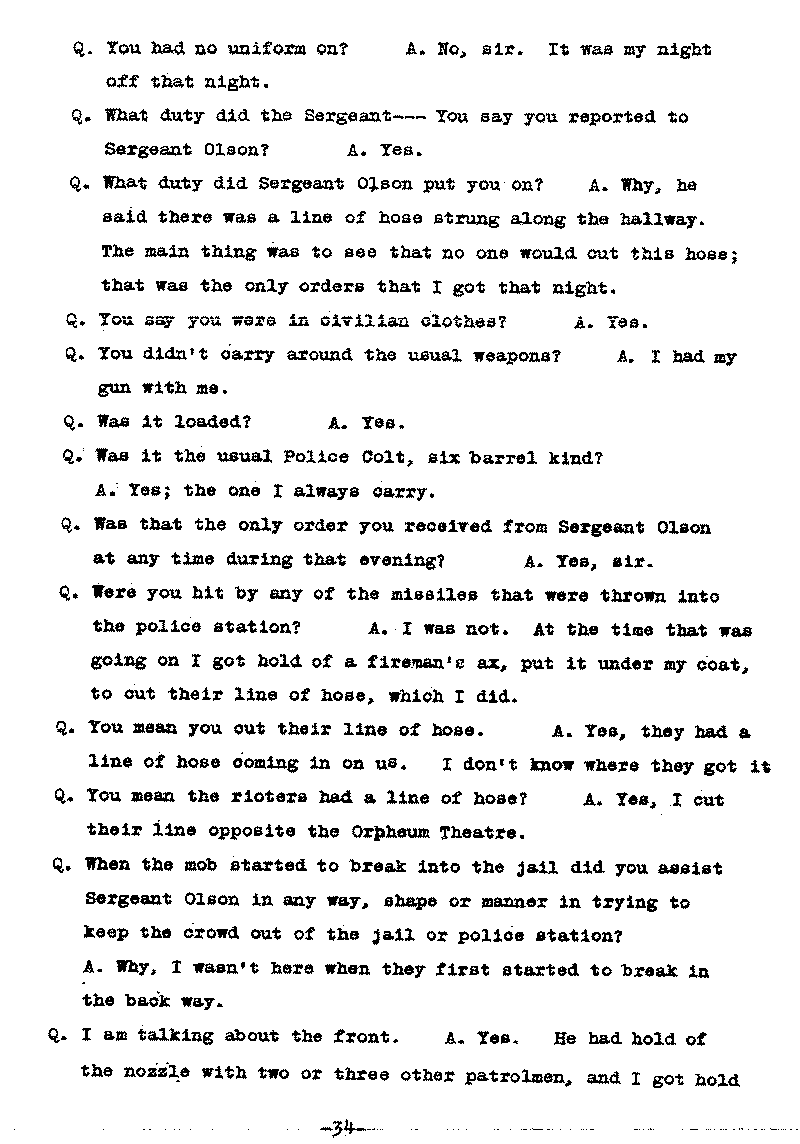
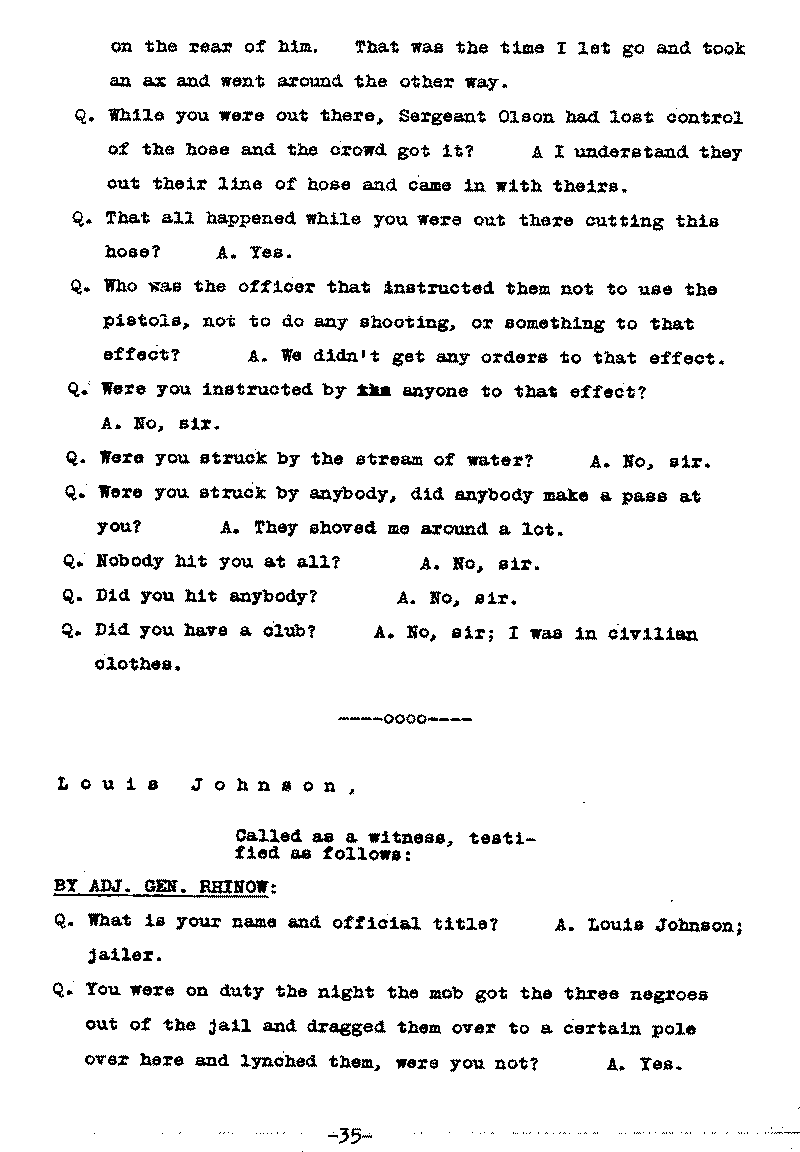
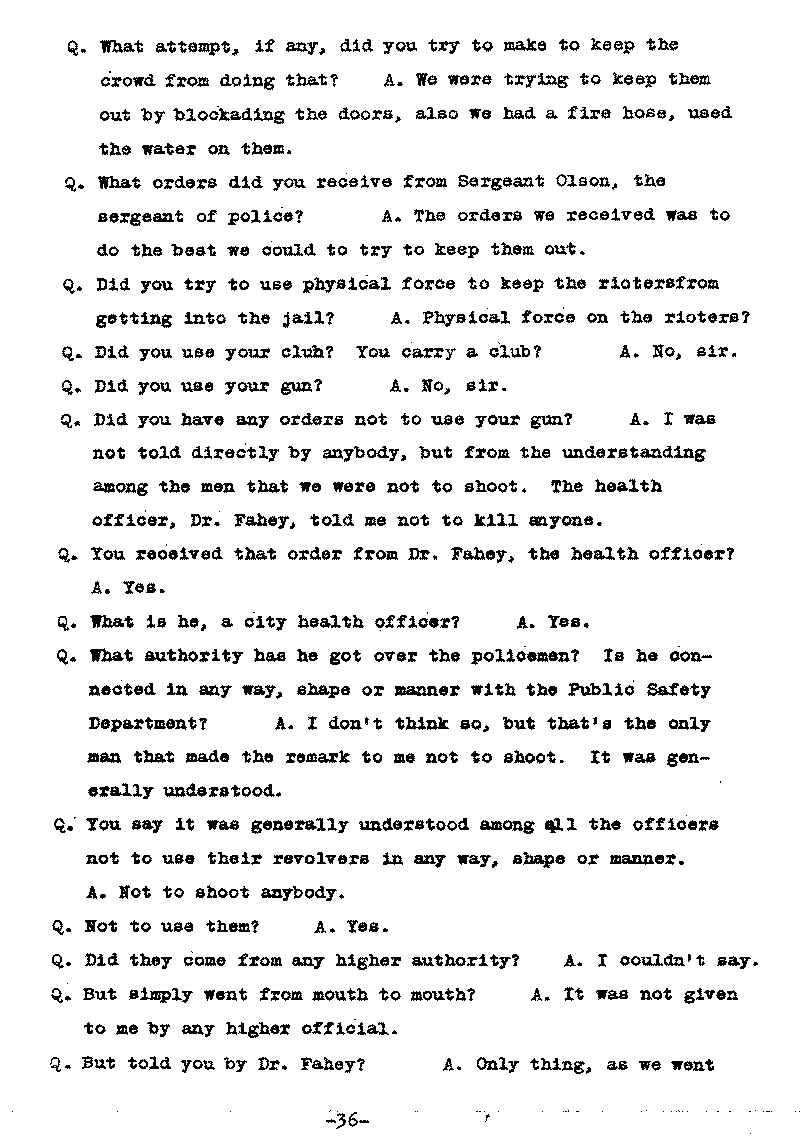
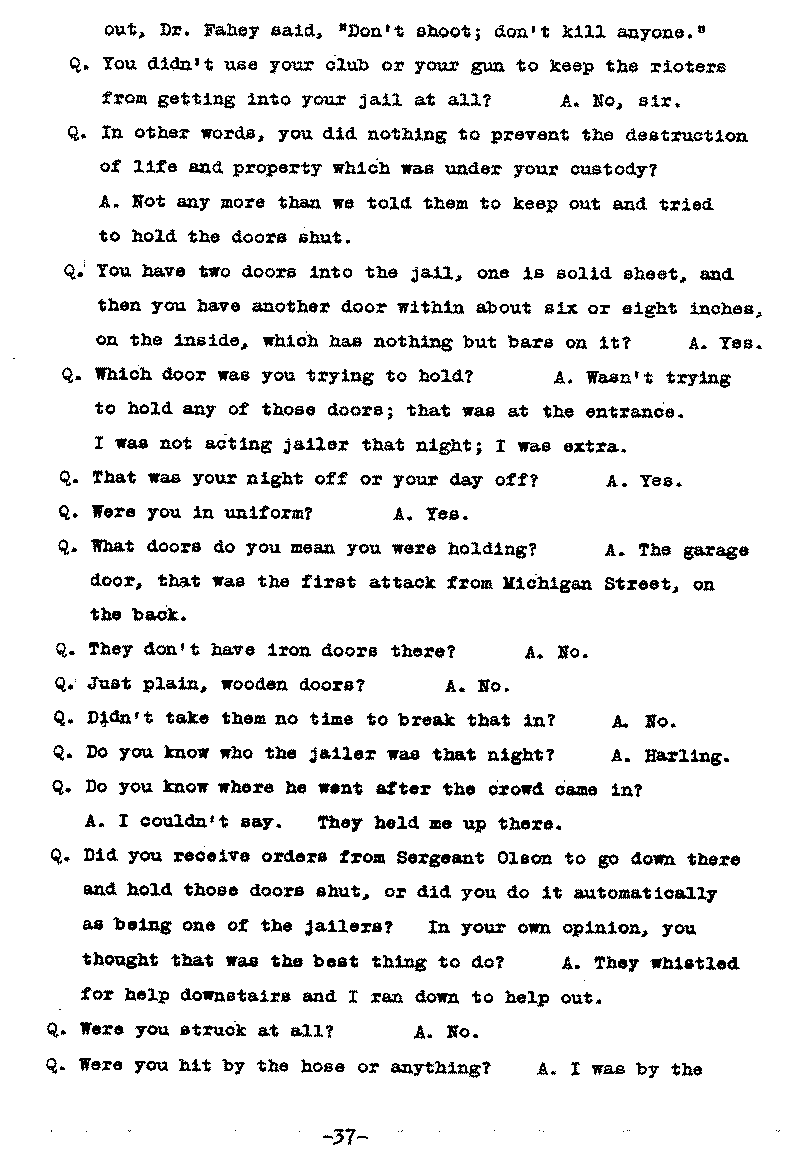
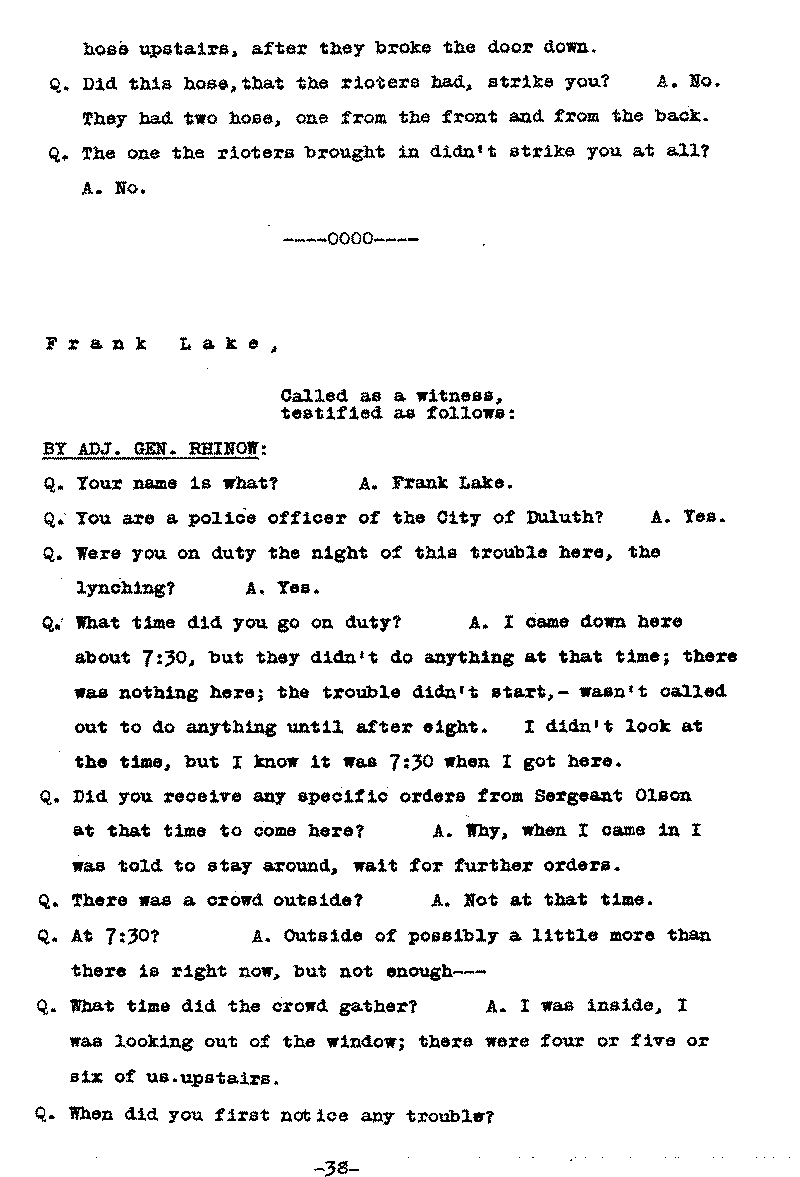
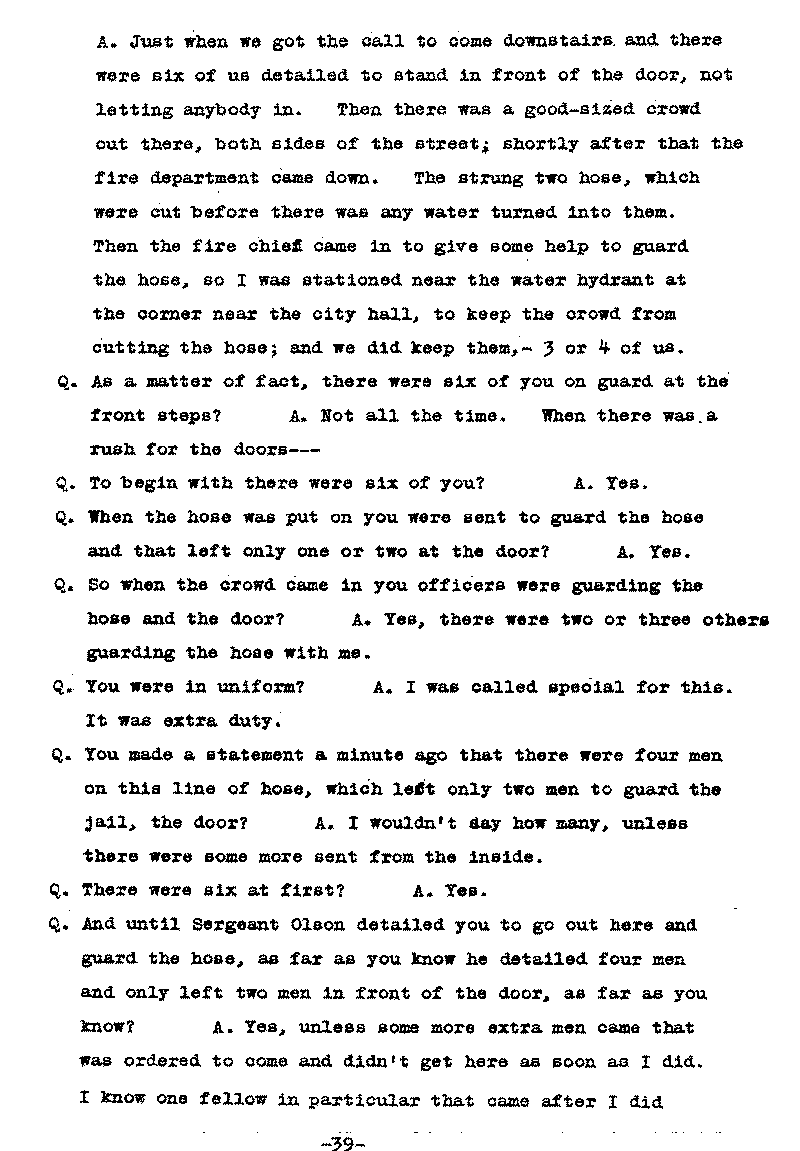
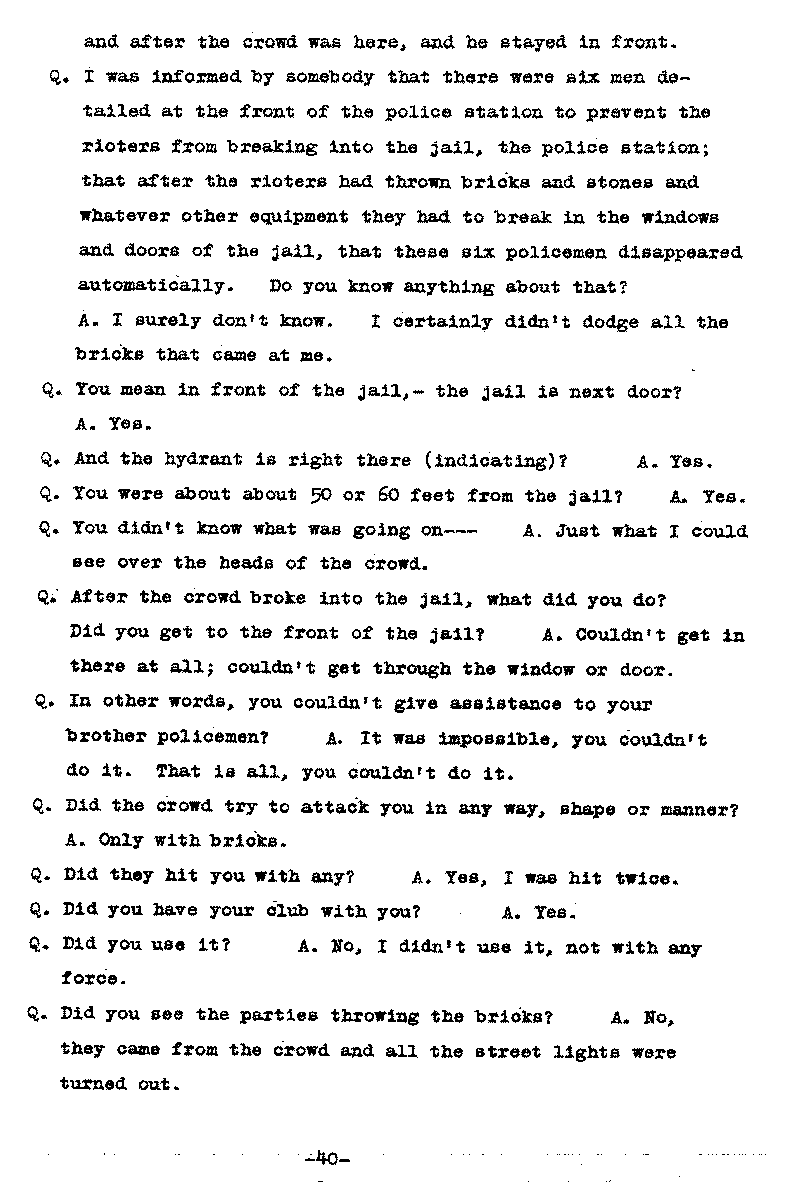
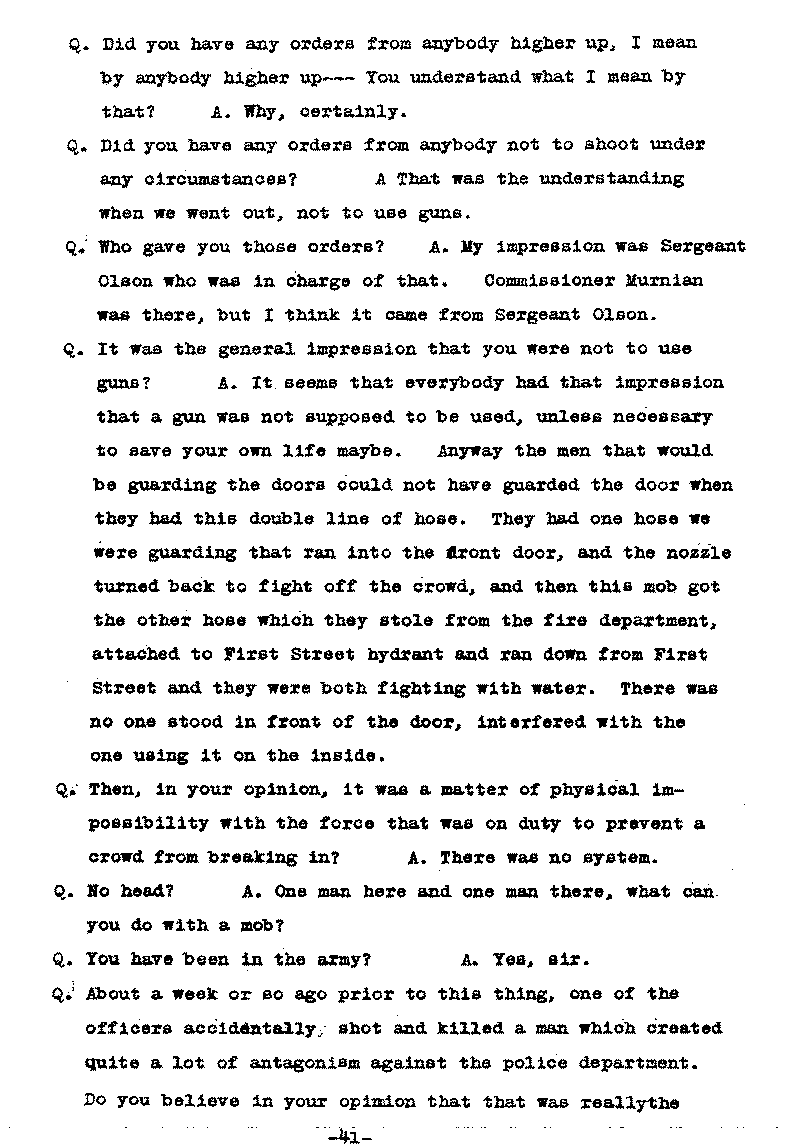
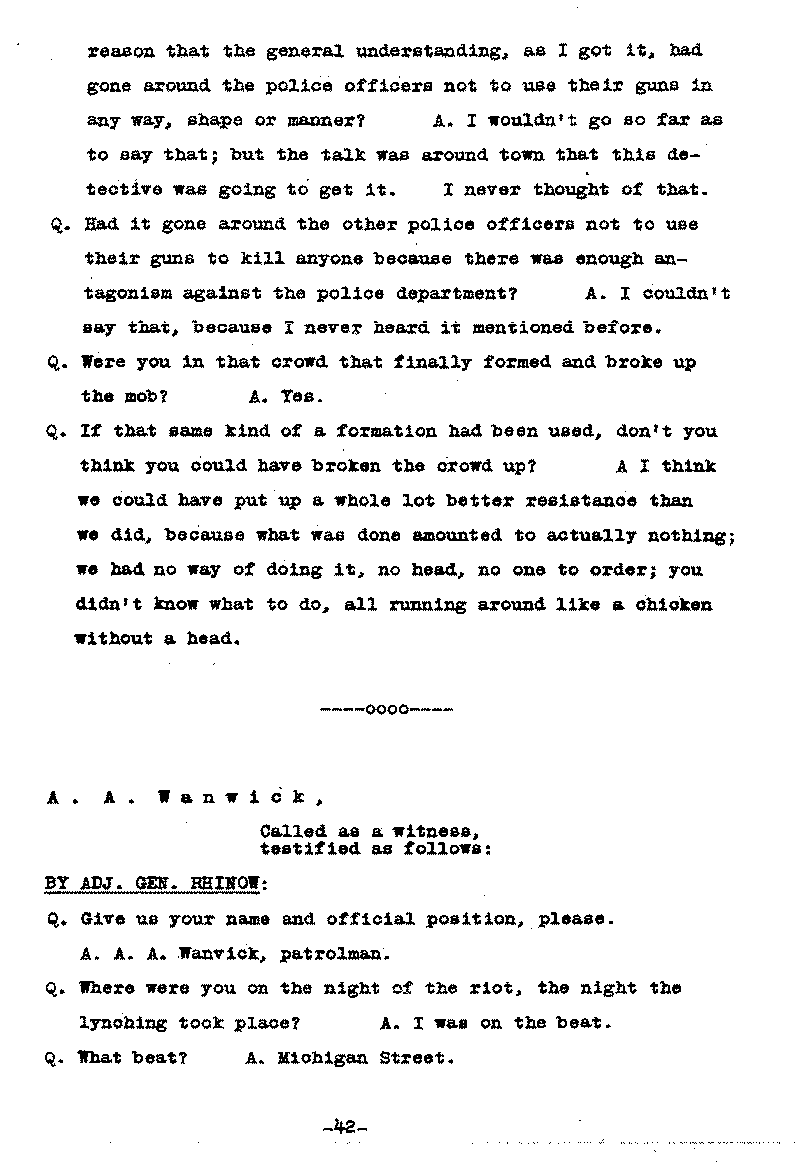
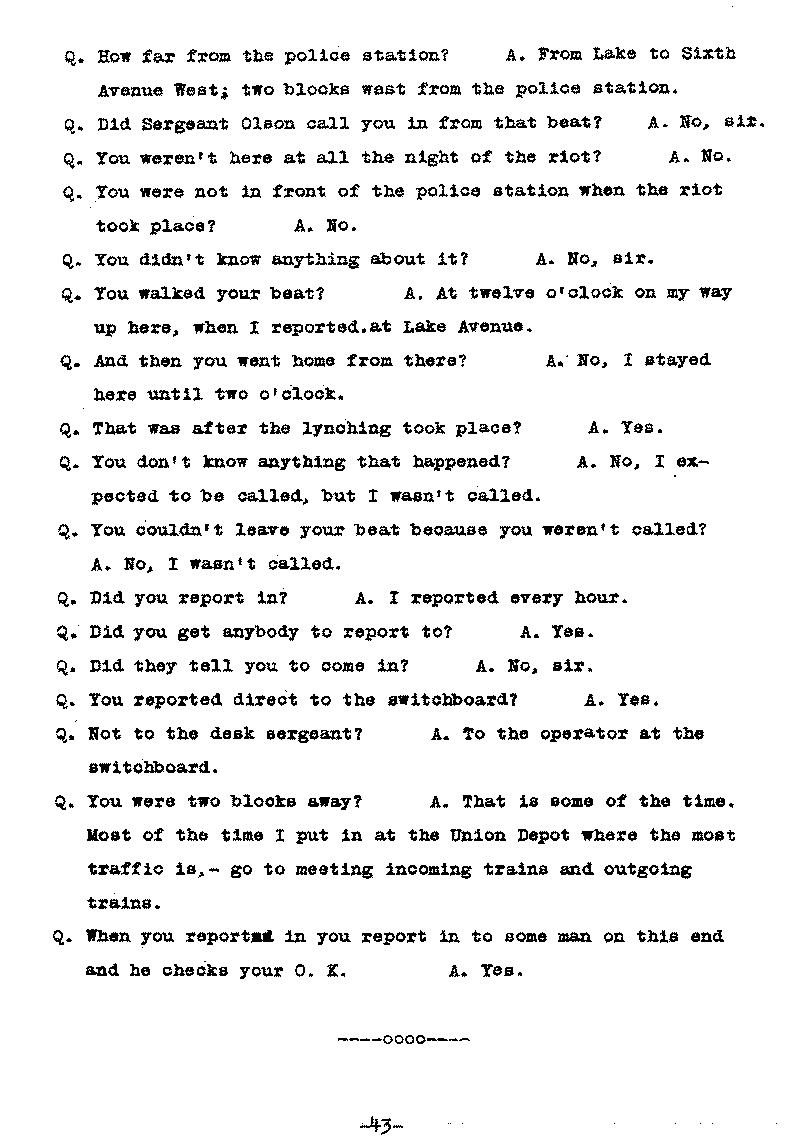
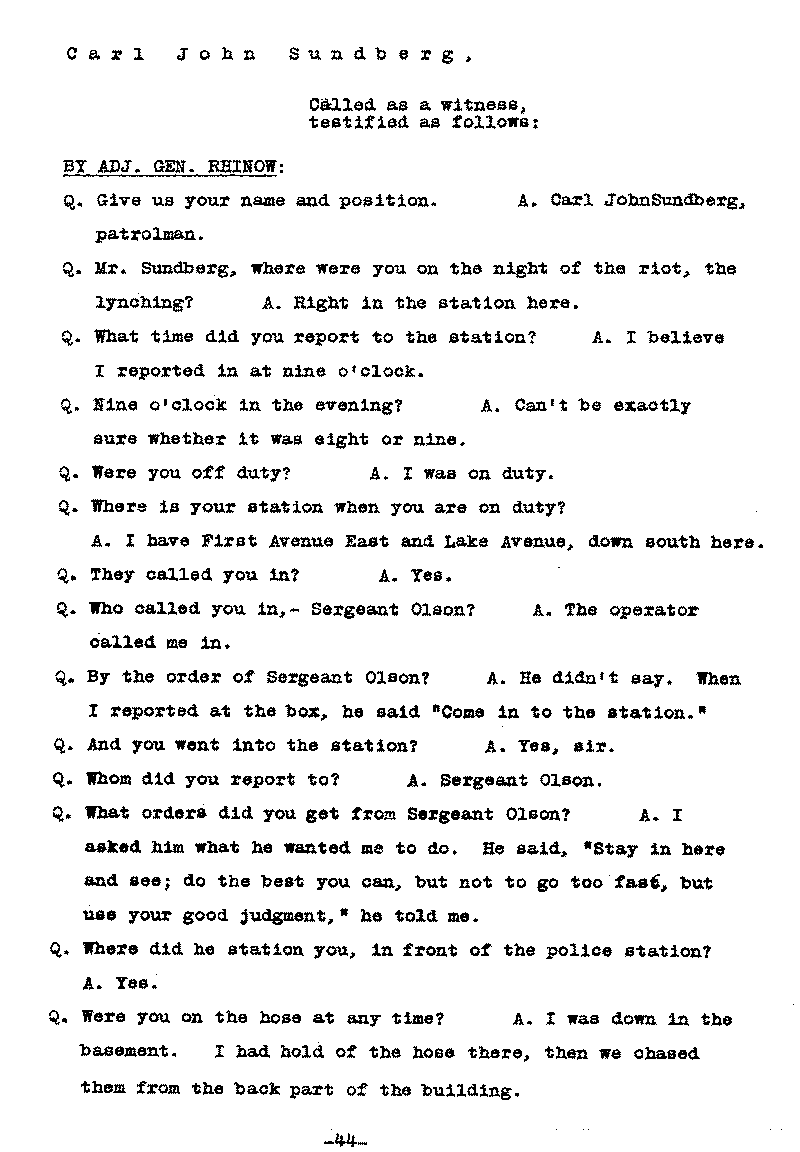
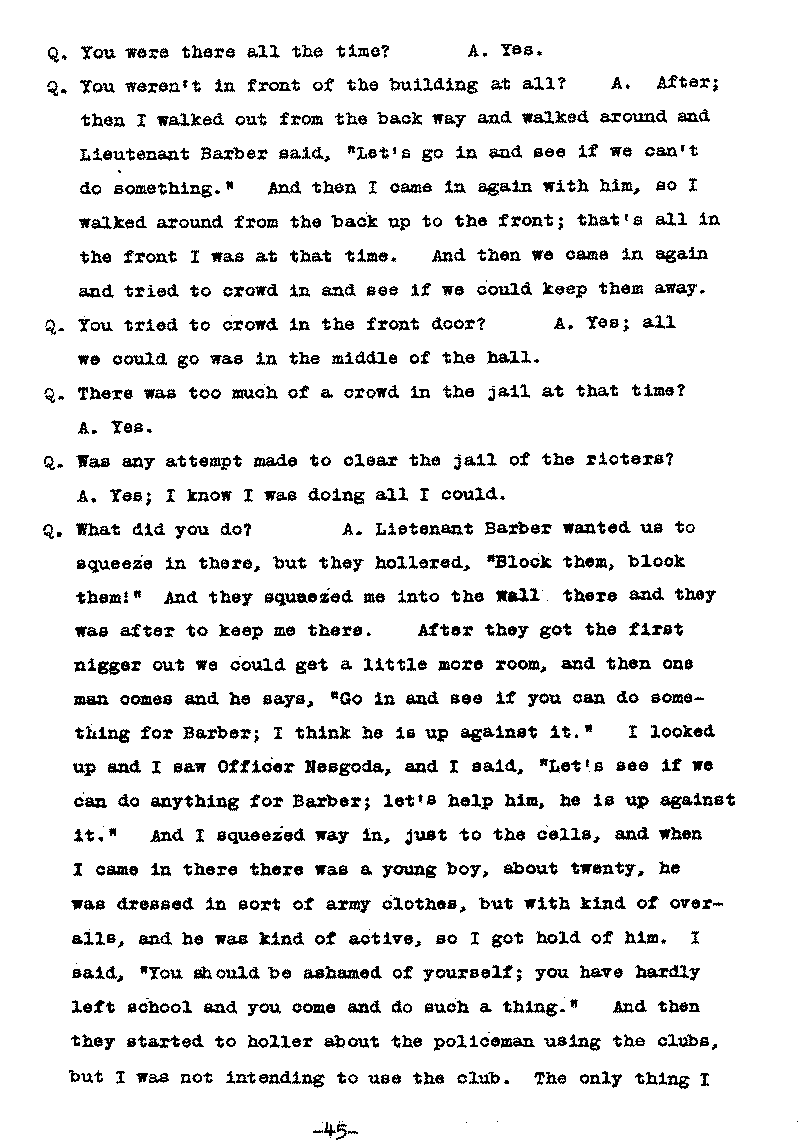
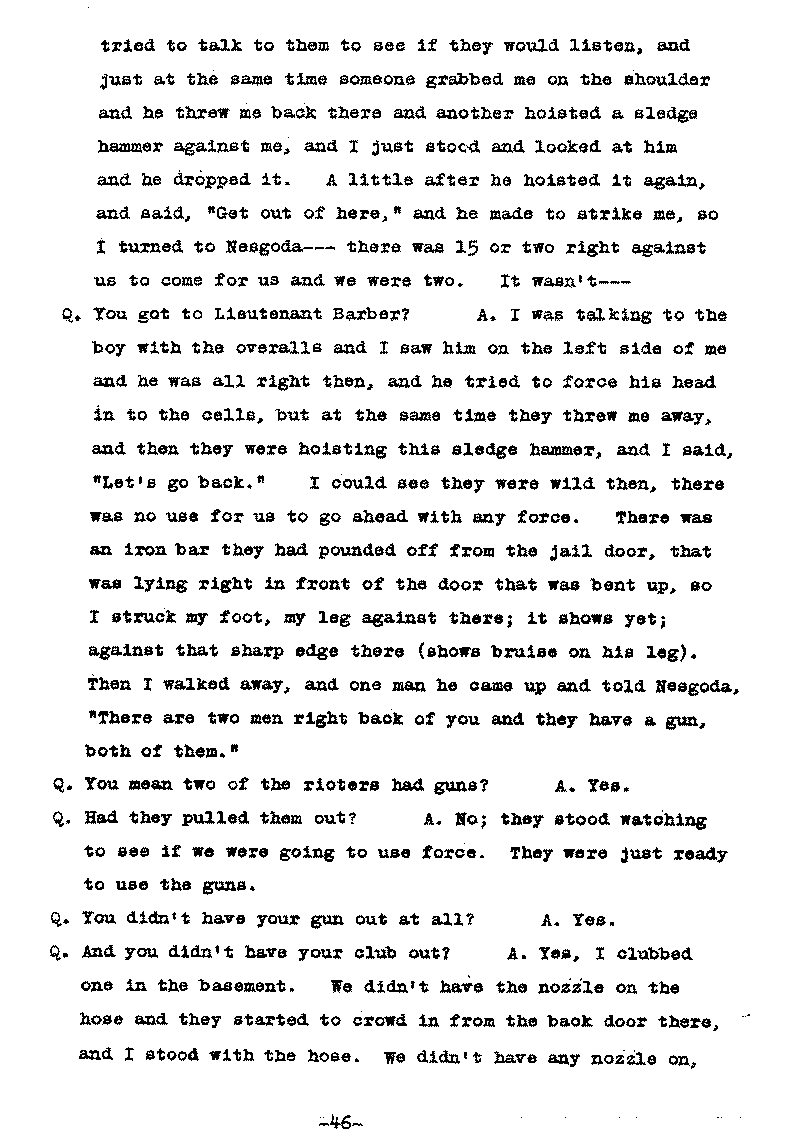
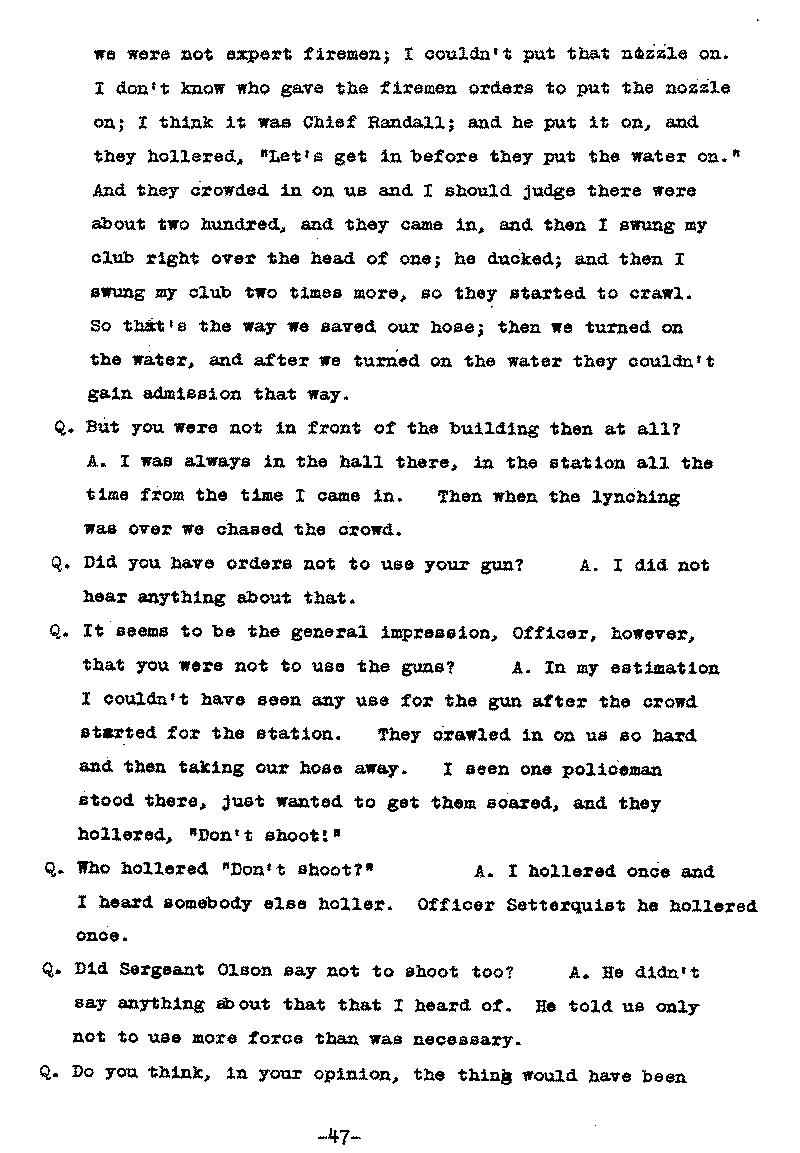
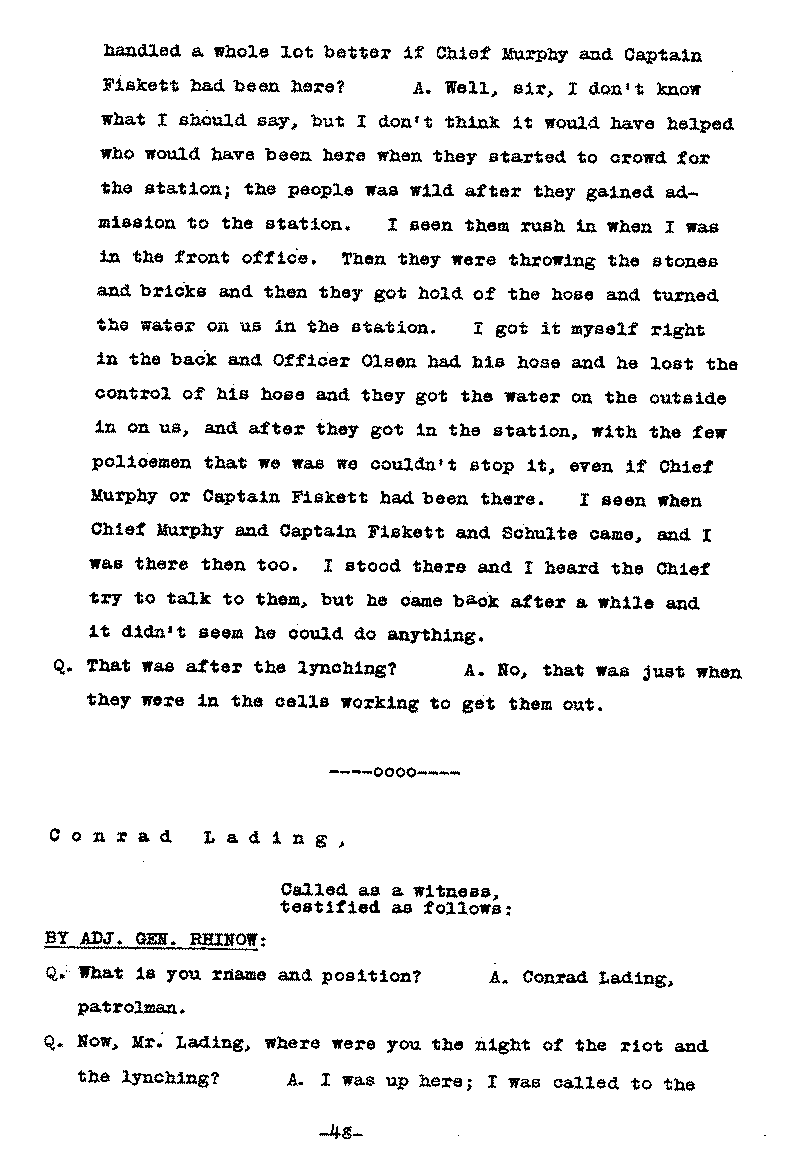
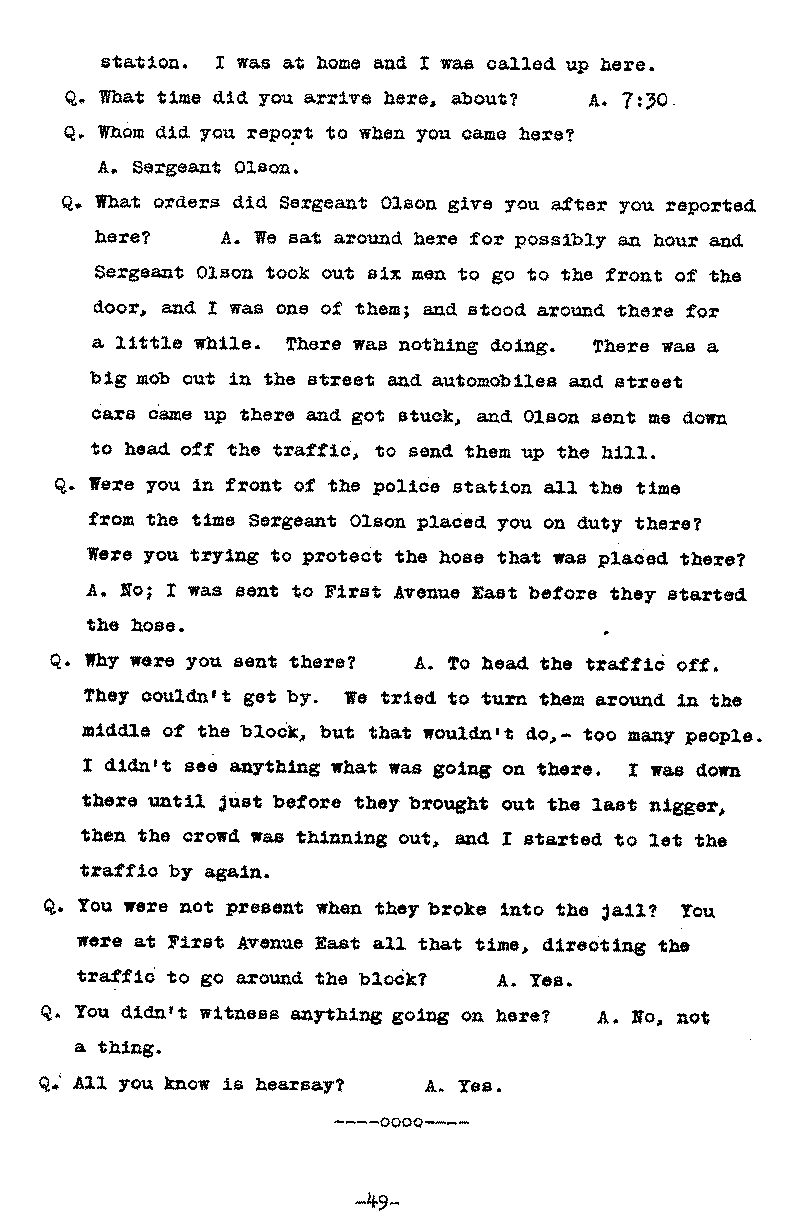
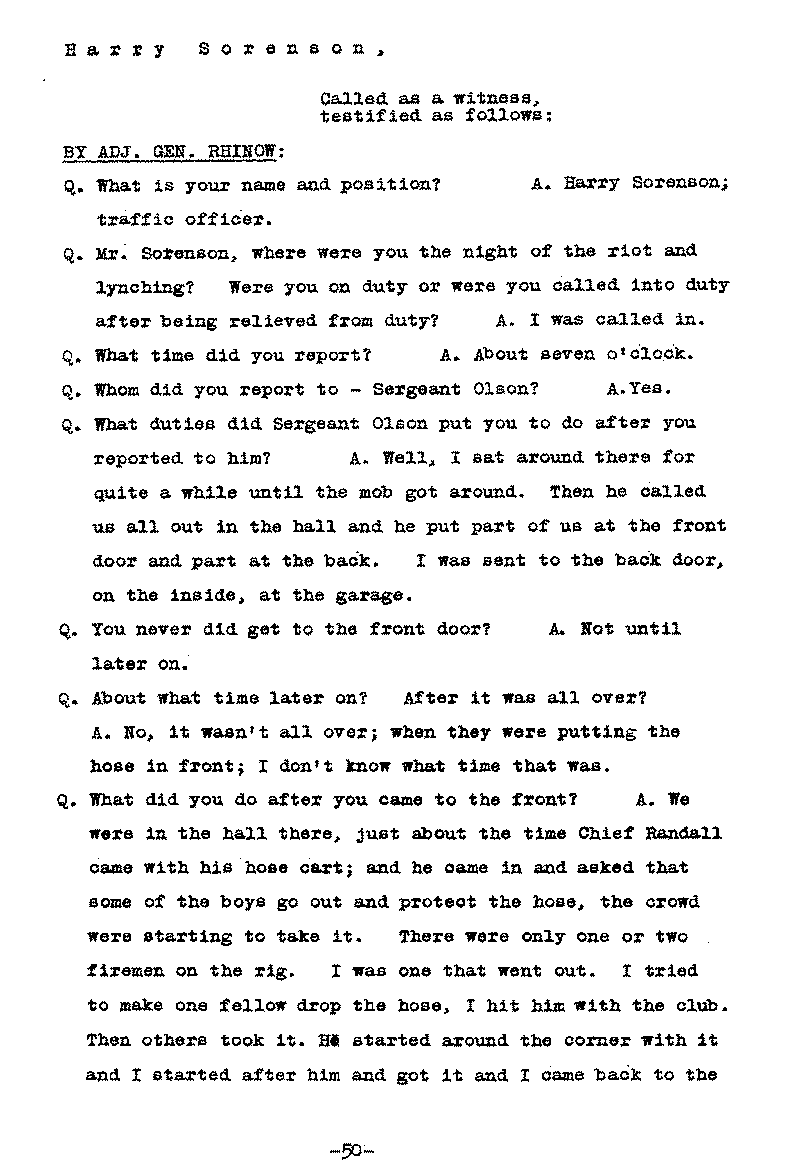
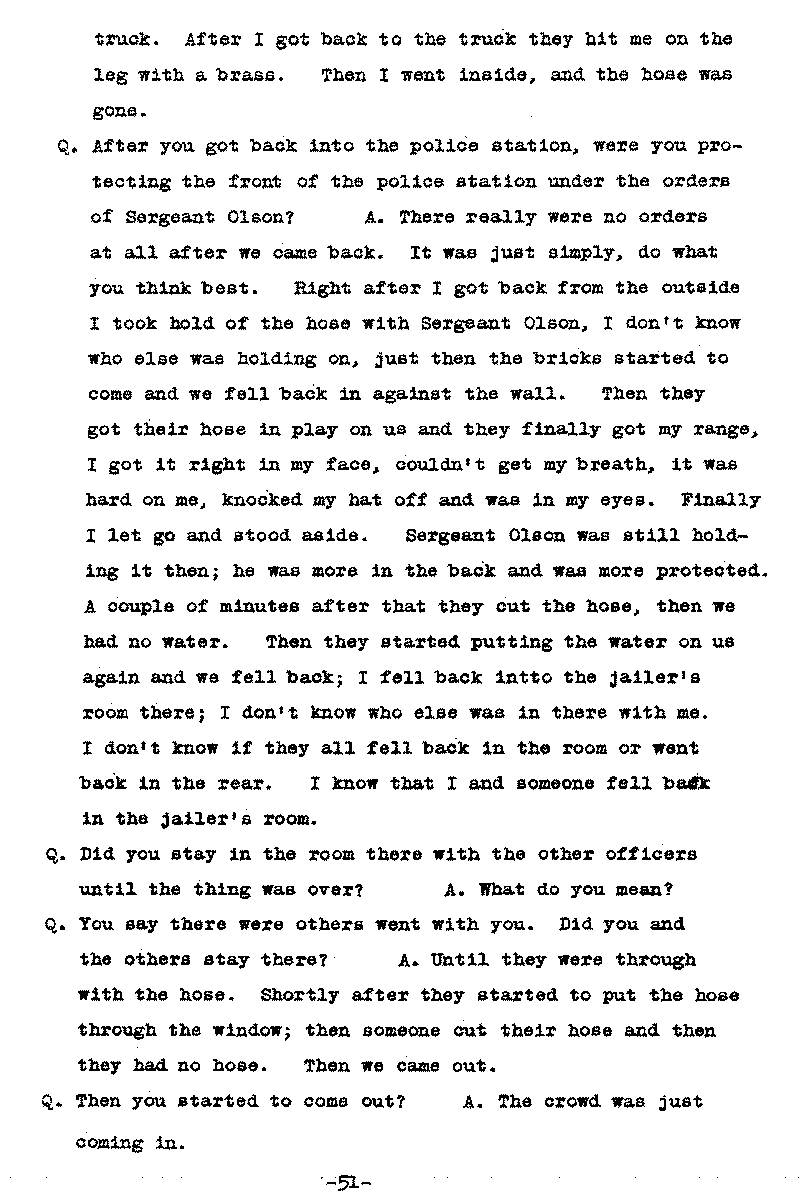
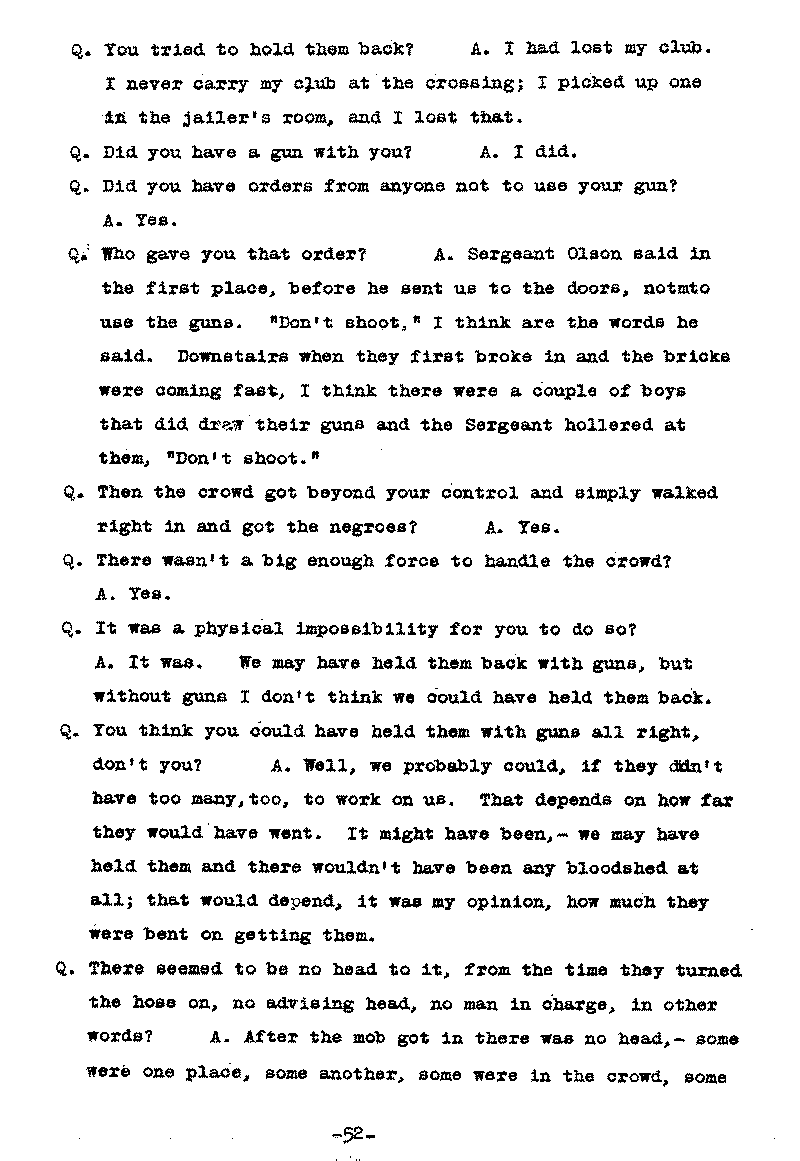
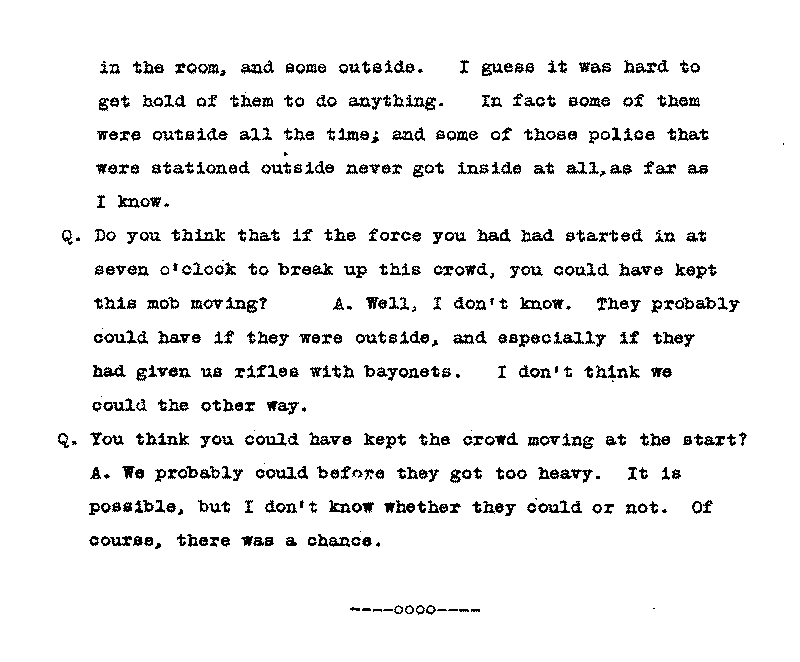
Image text
St. Paul Minn.
August 5, 1'920.
The Honorable J. A. A. Burnquist
Governor of Minnesota
St. Paul Minn.
Sir:
In conformity
with your instructions, I have the honor to submit the following report of my
investigation of the facts surrounding the lynching of three negroes by rioters
in Duluth on the evening of June 15, 1920:
1. Duluth Minnesota is
governed by a commission form of government. The legislative and executive
authority is vested in a mayor and four commissioners, the duties of the mayor
and commissioners classified as:
Division of Public Affairs
Division of Finance
Division of Public Works
Division of Public Safety
Division of Public Utilities
There is under consideration in this
report only the Division of Public Safety. The mayor and commissioners are
elected by vote of the people, and commissioners are assigned to specific duties
in charge of a division of the city's administration by a vote of the
commissioners including the mayor, a total of five votes. Three votes of the
five are necessary to elect to assignment.
Commissioner W. F. Murnian was
duly elected by the people and assigned to the Division of Public Safety, and it
is presumed that upon entering his duties as a Commissioner, he took the oath
usually administered to city officials,--to uphold the Constitution of the
United States and the State of Minnesota; to enforce the laws of the State of
Minnesota and the ordinances and regulations of the City of Duluth. He is
charged with the organization, discipline and, efficiency of the police force;
is privileged to select a Chief of Police, but all other members of the police
force are selected by civil service examination.
2. Evidence submitted
during the investigation disclosed that on June 14th "The John Robinson Circus"
was exhibiting in Duluth at a place known as the "Circus Grounds" and that among
those who witnessed the evening performance was a Miss Irene Tusken, aged
eighteen, residing at 4836 West 6th Street, Duluth Minn. It is alleged that
about 9:30 p.m. several negroes assaulted and ravished the young woman named.
Six negroes were accused and subsequently arrested at Virginia during the day of
June 15th.
The story of the assault upon the young woman spread rapidly
and indignation ran high. Rumors were afloat in West Duluth as early as 3 p.m.
that the negroes would be lynched that night, and a policeman on duty overheard
plans for the lynching at Police Headquarters as early as 5 p.m., and according
to his statement, did not report the facts until 7 or 8 p.m. About 5:30 p.m.
several young men on a green truck travelled [sic] down West Superior Street,
the principal street in the city of Duluth, waving a rope and shouting to the
bystanders to join a "neck tie party” at Police Headquarters.#2.
Commissioner Murnian does not admit that he had knowledge of the lynching
prior to his official notification by a police sergeant at about 7:30
p.m.
At about 8 p.m. a mob formed before the City Jail where the negroes
were incarcerated, and in unmistakable language declared their intentions of
over-powering the police, forcing the jail and lynching the negroes. Meeting
with no resistance from the Police Department, the mob grew rapidly, bricks were
being thrown freely, and it was reported to the police that there were fire arms
in evidence. Finally between the hours of 11 and 12 p.m., the mob overpowered
the inconsequential resistance then offered by the police, surged its way into
the jail, broke down the cell bars and took possession of the negroes. It
delayed for a sufficient period in the jail to hold a mock trial, the negroes
being permitted to testify as to their guilt or innocence, then hurried a block
from the jail, where they were hanged from a telegraph pole.
3. Since
Commissioner Murnian has served as head of the Division of Public Safety, he has
taken no active steps toward inaugurating the proper discipline in the
functioning of the police force. Of all the ranking officers on duty during the
period of the lynching, there seemed only one, Sergeant Olson, cognizant of the
significance of his oath of office,--and he should be commended for having
exercised an honest endeavor to perform his duty. Sergeant Olson made a valiant
effort to disperse the mob in its early formation, and prevent the lynching. Had
his fellow officers been imbued with the proper instinct of discipline, the
orders issued by Sergeant Olson would have unquestionably been carried out, and
the lynching would doubtless have been avoided, notwithstanding the insufficient
police force in Duluth. The attempt to now pass the responsibility of the riot,
and its outcome, to the Sergeant Olson in question, is quite apparent and
regrettable.
4. I request also to call your attention in this connection
to the handicap above mentioned, under which the safety department of Duluth is
operating; namely, the insufficient number of police. The very small force is
not large enough to properly police the extended area which it is called upon to
cover, most especially in an emergency of this character.
5. It is the
opinion of the undersigned that Commissioner Murnian erred appallingly in not
requesting the assistance of the sheriff, or the state, at a much earlier time
than he did. Prior action, it is believed, would have thwarted the rioters and
prevented the lynching. He having been present in the police station during the
assembling of the mob, and the ultimate lynching, and not having exercised the
duties required of him by his oath of office, is guilty of malfeasance in
office, and has shown a woeful lack of courage, decision and
competency.
The above resume of facts is respectfully submitted.
W. F. Rhinow.
The Adjutant General.
INDEX
JOHNSON, LOUIS 35
LADING, CONRAD 49
LAKE,
FRANK 39
MURNIAN, W. F. 29
MURPHY, JOHN
1
OLSON, OSCAR G. 10
PAYER, JOSEPH
33
SORENSON, HARRY 50
SUNDBERG, CARL JOHN
44
WANVICK, A . A . 42
----oooo---
TESTIMONY OF WITNESSES.
Investigation in the matter of the lynching of three negroes in the City
of Duluth, Minnesota, on June 15th, 1920, conducted by Adjutant General W. F.
Rhinow, in the office of the Commissioner of Public Safety, at the City Hall, in
the City of Duluth, on Wednesday, the 23rd day of June, 1920, at two o'clock in
the afternoon.
Present:
Adjutant General W. F. Rhinow,
Major Grady,
Major Beecher,
J. E. Samuelson, City Attorney,
Duluth.
----oooo---
John Murphy,
Called as a witness, testified as follows:
BY
ADJ. GEN. RHINOW:
Q. Please state your name and the position you hold
in the City of Duluth.
A. John Murphy; Chief of Police of the City of
Duluth.
Q. Will you tell me, Chief Murphy, in your own way, just what
happened
during this lynching?
A. I had a phone call at 2 A. M., that
was Tuesday, June 15th, from a man
by the name of Sullivan, working at the Duluth & Missabe ore docks. He asked me if I could come down to the docks immediately, as he had something
-1
of importance to tell me. I asked him if I needed any men with men, and he said I could figure that out after I had got there. I got a machine from the station and drove to the ore docks, and Mr. Sullivan informed me that a boy had told him that a girl from West Duluth had been raped by some niggers who were working for the Robinson shows. I then phoned to the N. P. dispatcher's office and asked if the show train had left their tracks. They said yes, they had gone to the D. W. P. I then got into connection with the yard master of the D. W. P., and instructed him to hold the train at West Duluth until such time as myself and the officers could get out there. I then phoned to the police station and told the sergeant in charge to round up at least ten or fifteen men. I then drove back to the station and sent for Captain Fiskett and Chief of Detectives, Schulte. We picked up what men we had gathered together and went out to West Duluth. We started down along the train on both sides, rounding up every nigger that was on the cars, put them into wagons, until we had got back to the coach that the niggers were sleeping in, what they call their colored sleeping car. We got all the niggers out and lined them up. We then got the different foremen of the show troupe to pick out their niggers that were working under their charge. We then got the timekeeper to check back and see that every man under them was there for the roll call, as we had figured that the niggers that committed this deed were ones that must have been idle between nine and ten p. m. of the 14th. Detective Schulte and Captain Fiskett questioned each one of those crews that were idle and picked
-2
thirteen niggers out of that bunch as ones that were in some way implicated.
We then allowed the train to proceed to Virginia. We marched the thirteen
niggers down to the street car tracks at about 60th Avenue West, and we came in
with the machine. After we got the niggers in here we investigated from them as
to what part they took in the doing, and we had come to the conclusion that four
of them were guilty, one was doubtful and one we held as a witness, that was
this nigger Isaac McGie. During this investigation we had we discovered that
there were several other niggers, of which we had got their names, that had
gotten away from us and had went with the show to Virginia. Myself, Schulte and
Fiskett then got in a machine and drove to Virginia, leaving Duluth at 12:02; we
arrived at Virginia somewheres around 3:30. At about the time we arrived at
Virginia this circus train had arrived there and one or two wagons were driving
up the street. We thought it was best for us not to be seen, as some of these
niggers that we wanted might try to get away, so we turned the matter over to
the Virginia police and they called on some of the deputy sheriffs there. With
the assistance we got from some of the foremen of the show troupe we picked out,
I think it was, nine more niggers that we thought were implicated in it. We left
Virginia at 8:10 with four of the niggers to come to Duluth, figuring that we
would have the deputy sheriffs take the other five to Duluth on the morning
train. We lost about 30 minutes getting out of Virginia, on account of getting
turned around on the streets, and then came direct through on the Vermillion
Road. At about 10:30 or 11 o'clock we met Commissioner Farrell, driving north,
about 17 miles, 16 or
-3
17 miles out of Duluth, and he told us that the mob had gone down to the police station to take the niggers and that it wouldn't be safe to take the niggers we had with us in. I then asked Farrell to take the niggers over to his place, which is about a mile or so further on, and keep them there and we would drive in and come out later. He also told us not to drive into the station with our machine, as the machines that were there were broken up by the mob. So we drove into the fire station at Sixth Avenue West and First Street and asked the men at that department what was going on at the police station. They told us the mob were down here after the niggers, and we left our machine there and Schulte, myself and Fiskett walked east on First Street to First Avenue West and down First Avenue and then to the police station. From information that I have received, one of the niggers was hanged before we arrived at the station. When we went in there was quite a mob of people in the station, the big jail was jammed full. I tried to talk to the people outside and asked them to disperse and go away from there, that if they would leave us alone we would get every nigger that was implicated in that crime. We then tried to get in through the door of the big jail, but the mob was such that it was impossible for us three men to break our way through. There was one man standing inside the door – I have since found his name was Mr. Luzon - reached out through the door when Captain Fiskett was trying to shove in and said "Get the hell out of here or we will get you." I saw the mob was such that we couldn't do anything with it, so I said to Schulte and Fiskett, "Let's get out of here where we can get the militia." We then came over to the City Hall.
-4
First I tried to use the telephones at the station here, but they were both out of order. I tried to raise the sheriff, tried to raise Major Weaver, but I couldn't raise them, so Schulte sad Fiskett and I sat down and talked the matter over, and I said, "I think the best thing to do now is to get every officer we can get together and if we can get enough men we will throw cordon around the jail and start throwing those fellows out." By the time we got our men together we had somewhere around thirty. We then went back into the jail. I don't believe it was over ten or fifteen minutes at the most from the time that we arrived here until we had rounded up this bunch of officers, until we got back to the jail. I didn't see any part of the hanging or see the niggers at any time. I might also say that in driving up I spoke to Fiskett and Schulte that there might be something happen in Duluth, that is as to taking those niggers out there.
Q. You mean when you were driving--- A. When we were going to Virginia. One
of them said he didn't think anything would happen in. this part of the country,
that if it were down South it might. After we got to Virginia, Captain Fiskett
said, "You better telephone in, as there might be something doing down there."
So I telephoned to the station. I believe it was Sergeant Olson here that
answered. I asked him if there was anything doing down there and he said, "No.
everything is quiet." I told him to get every available man, day and night,
where he could get him on short notice if needed, and if any crowds assembled to
disperse them and see that the niggers were protected, and if anything happened
to call me back
at Virginia.
-5
Q. That was about two o'clock? A. 4:15, it must have been aground that
time.
Q. That was in the afternoon? A. Yes.
Q. When you left here, if I am not mistaken, you stated that you left here about 12:02? A. It was just 12 ; 02, because Schulte wanted to see what time we would make up there.
Q. There was no mob congregated, or that you had the least idea that there was going to be a lynching affair, or that the ,jail was going to be stormed, or anything else?
A. Everything was quiet, didn't hear a word, not a word that anything was going to happen, or talking of it.
Q. Whom did you leave in charge here, Chief Murphy, when you went to Virginia? A. I didn't designate anybody when I left. The sergeant or lieutenant who was at the desk, is always in charge.
Q. If I understand you correctly, during your absence at any time outside of the city, the sergeant or lieutenant is the one who automatically takes charge? A. Yes.
Q. Who was that? A. Sergeant Olson,-- Sergeant Olson says that Lieutenant Holstrum was called in after I left.
Q. Then Lieutenant Holstrum should have been in charge during your entire
absence? A. No, until he shift was over and the next man comes on.
Q. You
had no Assistant Chief then? A. No.
Q. After you came back, Chief, and you found the crowd was so great that it got beyond control of the police department, what effort did you make to ask for assistance from anyone? A. I called for assistance from those around there, if there were any citizens to come and help us, and
there wasn't even one solitary man, that made an attempt to come inside and
outside the police station.
-6
Q. Did you ask the fire department, the men of the fire de partment to help
you? A. I did not.
Q. Did you ask the Chief for assistance? A. I did not.
For the reason that I
could not raise the sheriff.
Q. You tried to get
the sheriff? A. Yes.
Q. But couldn't get him on account of the phones being
put out of commission
by the mob? A. I did afterwards get the sheriff's
wife and was told
he had gone to the court house, gone earlier in the
evening.
Q. Who followed the lieutenant in command at the station?
A. The
sergeant.
Q. What sergeant was it? A. I couldn't say as to that offhand.
(Witness
confers with Sergeant Olson.) Sergeant Olson said that he followed
the
Lieutenant.
Q. Who is the man you talked to from Virginia? A. I
wouldn't say for sure.
When I called the station I got the operator and I
said, "Get me the
sergeant in charge." The phone was buzzing some; I don't
think I asked
who it was talking, but I think it was Sergeant Olson. I
wouldn't say for
sure.
Q. How many sergeants have you who take charge of
the desk?
A. Either a sergeant or lieutenant takes charge of the
desk.
Q. How many have you? A. One in charge.
Q. During the entire
twenty-four hours? A. Three. It's either a sergeant or
lieutenant,- their
capacity is just about the same, only the title is different.
Q. You have
talked over the telephone to these offices before at various
times? A.
Yes.
Q. Don't you think you would recognize the voice? A. I could if the
phone was clear, but the phone was somewhat buzzing. But I could understand
what he said.
-7
Q. It is easy to tell from the desk record who the officer was in charge?
A. Yes.
Q. I wish that that information be secured. A. Sergeant Olson
says that it
was he who answered the phone.
Q. You directed Sergeant
Olson to take the necessary precautions? A. Yes.
Q. What time did you
arrive here? A. It was somewheres around midnight, it was between eleven and
twelve o'clock. I didn't look at my watch from
the time we left Virginia; it was 8:10 When we left. We lost maybe twenty or thirty minutes getting out of Virginia, but I know I drove at a good rate of speed.
Q. Are you in a position to know whether they lynched anybody after you reached here? A. No. But from what I heard since I know one was lynched before we arrived.
Q. When you entered the jail they were still attempting to get in? A. I
couldn't see, we couldn't get into the jail
Q. You have a jailer, I suppose,
here? A. Yes.
Q. What is his name? A. Fred Harling.
Q. He was on duty at
that hour? A. Yes.
Q. He had the keys for the different cells? A. I believe Jailer Johnson had
the keys, because he told me he wouldn't give up the keys to the
cells.
SERGEANT OLSON: I had the keys.
Q. As I understand it, one man has
the keys to the cells and another man the
keys to the corridor? A. The
jailer generally has the keys.
Q. But at this particular time when the mob
came in, at that particular time,
Sergeant Olson had the keys, did he? A. I
couldn't say as to that
because I wasn't here at that time.
-8
ADJ. GEN. RHINOW: Sergeant Olson, you had them?
SERGEANT OLSON: Yes, the
keys to the cells.
Q. What fire-arms have you? A. Club and 32 revolvers; we
also have 45
rifles.
Q. That equipment then consists of a club and 32
revolvers and you have a
supply of 45 caliber rifles. A. I wouldn't say as
to the caliber of them.
Q. How many of those rifles are there in the
station? A. I believe there
are 45.
Q. Have you any rules or regulations
covering the use of either offensive or
defensive equipment? A. Well,
nothing more than the law.
Q. Do you have any practice in using any of that
equipment? A. The only
thing we practice with is the revolver.
Q. You
have a pistol range? A. We have pistol practice; that has been
spasmodic.
Q. Not a regular procedure? A. We aim to mate it regular, but
it is irregular.
Q. At what time were those 45 rifles brought into use in
defense of this
building? A. After we had the conference here in the city
hall.
Q. Which was after the colored men had been removed? A. I believe
they were removed then; I couldn't say as to when they were removed,
before we got in or after we got in, as I didn't see any part of
it
Q. You took the other three men out? A. Yes. Not myself, personally.
Q. At about what time after you had secured these rifles and had put them to
use, did you remove these other three? A. Just as soon as we got the rifles and
threw the men out
-9
in front of the station--- Fiskett was inside, Schulte was inside, and I don't know what man it was took these three niggers downstairs and out the back way, and put them in the machine. Before they were taken everybody was cleared from behind the building, and the mob was up on Superior and Second Avenue East.
Q. At any time during the riot was a shot fired either by the patrolmen or by
any members of the mob? A. Not to my knowledge. I understand that there was one
shot,- I have heard that there was one shot fired by the mob, but I don't know
if there is any truth to it.
---ooo---
Oscar G. Olson ,
Called as a witness, beatified as
follows:
BY ADJ. GEN. RHINOW:
Q. Will you give your full name,
your title and what your official duties are? A. Sergeant Oscar G. Olson.
Q. If you will, tell me in your own way, what you know of this lynching in Duluth here? A. Why, on the morning of the 15th, at three o'clock I received a phone call at home, I was in bed sleeping, and I answered the phone and the operator at headquarter station asked me to report at
headquarters at once. I dressed and went down here as soon as I could. Got
down here about 23 minutes after three, and while in the station here I heard
that there had been some negroes had assaulted a young girl at
the
-10
circus grounds, and together with other members of the police force we
went out to the West Duluth police station, and from there we went out to the Canadian Northern yards where the circus train was to leave town, and we rounded up possibly about 200 negroes there and lined them up. Each one was talked to separately by Chief of Detectives Schulte and the Captain of Police, and after we got through talking to all of them we left there with twelve or thirteen negroes; took them to the street car and brought them here to headquarters about 7:30 that morning. I went home and went to bed. My wife called me at 2:30 in the afternoon; had a little lunch end went down to work and reported for duty at 3:35. I took charge of the station at four o'clock. Shortly after four I received a phone call from Chief Murphy at Virginia. He asked me how things were down here and I
said everything was all right; I hadn't heard anything yet; and he instructed
me to---if I heard of any mob gathering, to see that I could get all the police
that were off duty, so that I could get them on short notice, and also, if I
needed to, to get the sheriffs. So a little later I received a phone call asking
me if I had heard of the mob going to lynch the negroes that were in jail. I
told this party I hadn't heard any such thing.
Q. Who was that party? A. I
don't know!
Q. What time was that, about? A. Possibly 4:30. And I called in a motorcycle
officer, instructed him to go down the street to see if he could see mobs of any
sort, out of the ordinary, down the street. If he did, to find
out what they
were talking about. Instructed him to go to different pool
halls or places
where there might be
-11
young men gathering. He came back about forty-five minutes later and
told me that he didn't see any mobs, didn't hear anything in particular about mobs coming here to the station to lynch the negroes. Sometime
later there was a business man from West Duluth came in and told me that he thought there might be some trouble here to-night.
Q. What time was that? A. I think that was between 6 and 7 o'clock. So I then
instructed the operator to call all the men off duty and to report at police
headquarters at once, and also call in the men on the outlying districts, and
also call the sheriff.
Q. What time did you call the sheriff? A. I believe
that was a little after
seven.
Q. Did you talk to the sheriff
personally? A. No, sir; one of his jailers.
Q. What did you tell the jailer
at the county jail? A. I told him that I had
heard that there may be a mob trying to lynch the negroes that we have here
in jail and that I would like to have the sheriff notify and have him get all of
his deputies, as many as he could spare, and get down here and give us
assistance if we needed it. I also called the chief of the fire department, told
him what I had heard, and asked him for assistance, hose and men; and he said
that he would instruct his men so that if they got a call from the police that
they would know what to come with. And I also called up the Commissioner of
Public Safety, told him what I had heard, told him what I had done, and he said
that he would be down.
Q. What time did the Commissioner of Public Safety
come down, about? A. Shortly after 7:30, 1 believe. And when
-12
he came down he and I went into the Chief's office. I told him the number of men that I had, that had already reported, which was eleven uniformed men; also told him what my plans were, and we talked the matter over in general, and were under the impression that the mob would probably try to run a bluff and that we would call their hand, and that would be about all there was to it.
Q. By stating there what your plans were, you mean that you had notified the
outlying policemen to come in and you had also notified the Chief of Fire
Department to assist you, and also the sheriff; that's what you mean by your
plan? A. Yes. And a short time later---it was sometime before this; I got a
little ahead of my story--I instructed the jailer who was on duty at the time,
Fred Harling, that we better try and see if we can get the negroes out of here.
I said, "It is better to play safe and be sorry." So we attempted to get three
negroes out at one time, and we only got one out---couldn't get him out of here
or back into the jail without being seen by some people at the back and also at
the front of the building, which we thought might be some of the mob.
Q. At
what time was that? A. That was,- Oh, from five o’clock on.
Q. Had the
crowd collected at that time? A. There was no crowd, but an
unusual number
passing by and stopping, that had passed by on both
sides of the street.
Q. What fear had you of running those prisoners through a few passersby?
A. My idea. of not taking them out was, I was afraid if they were taken away
from the police, in taking them to some place of safety, the general
public might think the police turned them over. About eight
o'clock
-13
there was quite a number had gathered. I was receiving a number of calls about shooting at different places, different parts of the city, and I took it for granted that they were false alarms, and I didn't send anyone on them, because I wanted to keep as many men as I had. And a few minutes after eight o'clock there was a mob gathered that packed this block here, in a very short time, and I called the men out, stationed six out in front and
four or five in the rear of the building; and we beat them off the front, then they went around to the back of the building and we beat them off there.
Q. You mean you had. to use physical force? A. Some of the policemen used their clubs.
Q. On the crowd, and beat them back? A. Yes. And the fire department came down here and made a connection with this hydrant on the corner, and they were already starting to out the hose when I took what men I had stationed in front to guard the hose between the entrance of the police station and the hydrant. They used the hose on them, and they had broken in the outside door and gotten into the garage and they were starting to come up the stairway, the back way, when we got the hose connected, and we fought them back with the water. We fought there for sometime and we beat them off there and then came around to the front and then turned the hose on them at the front. There were a few policemen in the crowd; and when they were in the back I ran out on to the street, I covered almost half of this block, and appealed to the citizens for help and no one responded to my appeals, so I went back to the station, and then the mob came around to the front and I myself took hold of the hose and ran out as far into the
-14
street with it as I could, to drive the crowd back. There were one or two
officers with me at the hose and the mob was firing bricks, stones and anything
they could got hold of at us. And I had, gotten in touch with the Chief of the
Fire Department, asked him if we couldn't get some more hose and a wagon was
sent up after some more hose, and when they came down here the mob took the hose
away from the firemen, attached it to the hydrant and turned the water on the
police. Finally the mob cut our hose and had broken all the windows in front of
the building, broken down one of the front doors. Our hose was cut and we had no
water. They finally got as far as the front door and I attempted to get out to
talk to them. I couldn't get out. I stepped back into the front office and they
turned the hose on me and also started throwing bricks through the
windows.
Q. How many men did you have on duty at the front door when the
water was
thrown and after the bricks were thrown? A. Just before the mob came in?
Q. When the mob was attempting to break in, just when they were throwing bricks and stones, how many men did you have on duty there?
A. Myself and two or three others.
Q. What had become of the rest of
them? A. I don't know.
Q. Anything that was thrown through the windows and doors, did it hit any of
the policemen? A. Yes.
Q. Hurt them? A. Yes.
Q. Did it disable them so they were put out of business, knocked out unconscious, or anything like that? A. No.
Q. Did they all have the usual weapons with them that are required by the
police department? A. Yes.
Q. Why didn't they use revolvers, why didn't they
shoot?
-15
A. I took the eleven policemen, before I stationed them out in the front and back, and cautioned them about chewing the rag, getting into arguments and not to talk to anybody, "and if you have to shoot,” I says, "shoot." "But," I says, "we have no ammunition; all 'I've got in my charge is 31 cartridges, and I don't feel like starting to shoot and lose out on top of it all. I says, "Keep away from shooting as long as you can."
Q. Each officer, while he is on duty, doesn't he carry a gun loaded all the
time? A. Yes.
Q. What kind of a gun does the regulation prescribe that an
officer should
carry? A. It's a .32 Police Colt's.
Q. A .32 caliber,
six barrel Colt Police Revolver? A. Yes.
Q. They all have those, and
loaded, all the time? A. Yes.
Q. You had six men there? A. Yes.
Q. Did
you yourself order them not to shoot? A. I cautioned them about
the
shooting; they were not ordered not to shoot.
